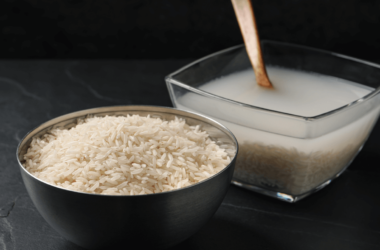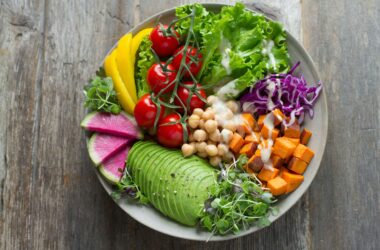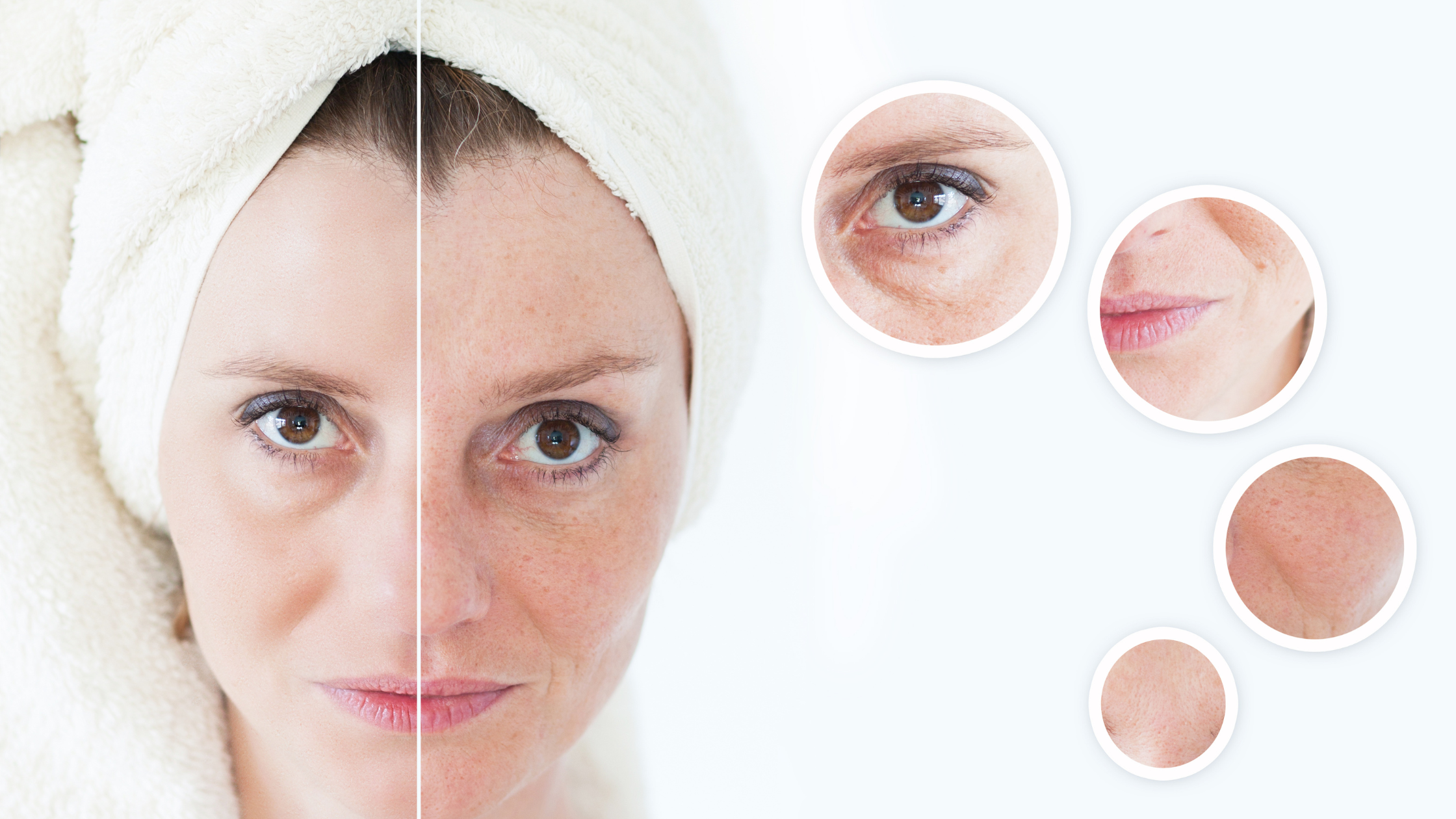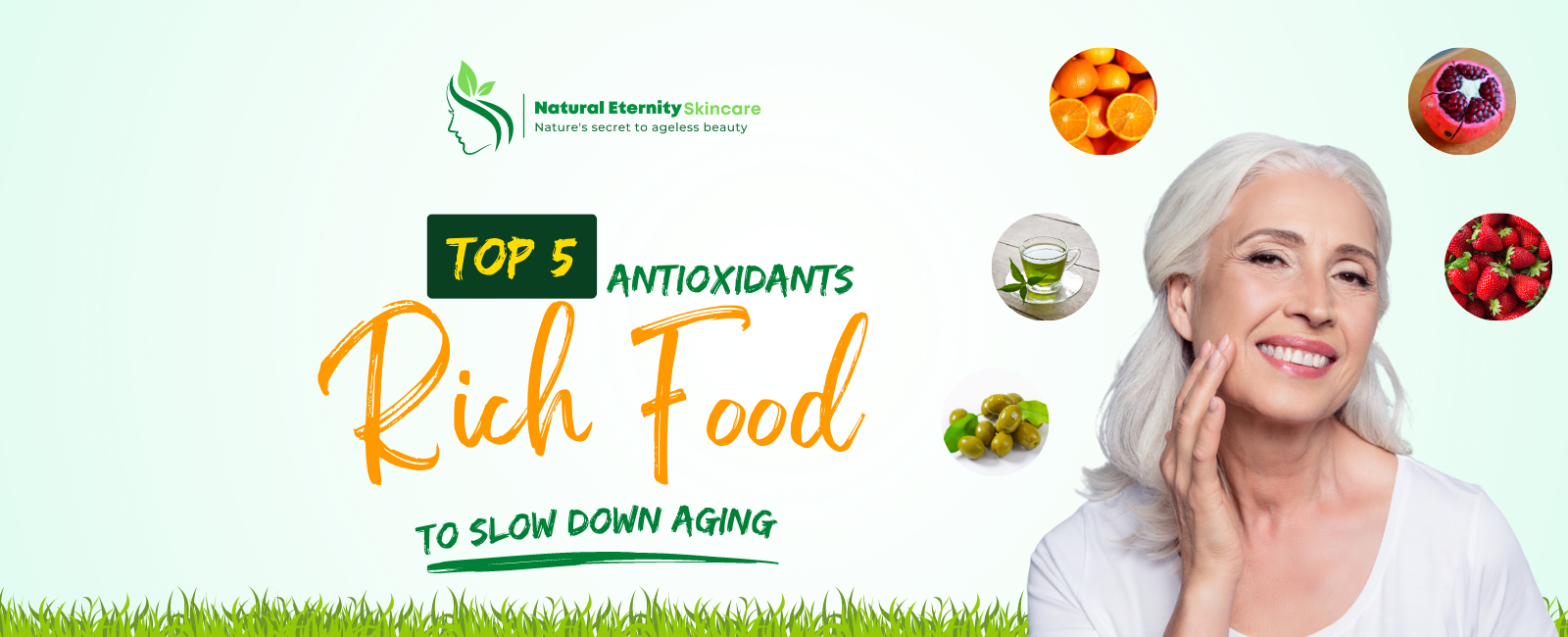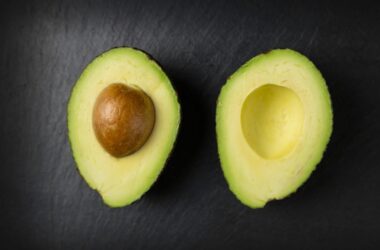Ever heard the saying, “You are what you eat”? Well, it’s true, especially when it comes to staying young and healthy. That’s why healthy eating for anti-aging is important.
Why should you care about eating for anti-aging? It’s all about feeling your best as you grow older gracefully. However, this isn’t about trying to be something you’re not, it’s about accepting your unique beauty and living life to the fullest at any age. Your food choices are your trusty friends on this fantastic journey.
Are you ready to find out how to stay young, energetic, and glowing? Let’s get started!
The Science of Aging

Aging is the natural process of our bodies changing as we grow older. However, It’s something that happens to all living beings, including us humans. While we might not be able to stop the clock entirely, understanding what aging is and what changes[1] our body goes through due to aging can help us make choices that keep us feeling and looking our best.
Here’s a quick rundown[2]:
- Cell Changes: Cells become less efficient at repair and maintenance.
- Collagen and Elasticity: Reduced collagen leads to skin wrinkles and sagging.
- Slow Metabolism: Metabolism slows down, making weight management more challenging.
- Bone Density: Bones become less dense and more fragile.
- Brain Changes: Cognitive functions like memory and processing speed may decline.
- Internal Changes: Organs, like the heart and blood vessels, may lose flexibility, impacting overall health.
It’s important to remember that aging isn’t all bad news. With age often comes wisdom and experience. Moreover, there are many things we can do to age gracefully and maintain our health and vitality.
Causes of Aging
There are two causes of aging which are a combination of intrinsic (internal) and extrinsic (external) factors[3]. Therefore, understanding these causes can help us make informed choices against healthy eating for anti- aging.
Intrinsic vs. Extrinsic Factors
Understanding the role of intrinsic and extrinsic factors in aging can help you make better choices and live a healthier life, which can slow down the aging process.
Here’s the quick comparison of both factors:
| Factor | Intrinsic | Extrinsic |
|---|---|---|
| Definition | Intric aging is the natural aging process that occurs over time due to genetic factors and cellular changes. | Extrinsic aging is accelerated by external factors, primarily environmental and lifestyle-related. |
| Primary Causes | Genetic makeup, cellular changes, hormonal changes, decreased collagen production, reduced cell turnover. | Sun exposure (UV radiation), smoking, pollution, poor nutrition, alcohol consumption, stress. |
| Onset | Begins in your mid-20s and progresses gradually throughout life. | Can start as early as your teens and accelerates with cumulative exposure to extrinsic factors. |
| Visible Effects | Fine lines, wrinkles, thinning skin, loss of elasticity, age spots, graying hair. | Wrinkles, age spots, uneven skin tone, loss of skin firmness, premature aging signs |
| Skin Impact | Skin becomes drier, less resilient, and more prone to signs of aging. | Skin damage includes sunburn, photoaging, and increased risk of skin cancers. |
Approaches to Anti-Aging

There are two main approaches[4] to anti-aging: natural and invasive.
Natural vs. Invasive Approaches
Let’s evaluate the effectiveness, safety, costs, and long-term outcomes of both approaches to help you make informed choices in your quest for a more youthful appearance.
Here’s a quick comparison between natural and invasive approaches:
| Aspects | Natural Approach | Invasive Approach |
|---|---|---|
| Definition | Non-surgical, holistic methods to slow down the aging process. | Medical procedures or surgeries that target visible signs of aging. |
| Effectiveness | Slower results but can be long-lasting with consistent efforts | Faster, more noticeable results |
| Safety | Generally safer with minimal risks | Involves potential risks, complications, and downtime |
| Cost | Typically more affordable in the long term | Often expensive, with costs per procedure |
| Pain or Discomfort | Minimal to none; may involve lifestyle changes and minor discomfort. | Procedures can be painful and may require anesthesia or recovery time. |
| Maintenance | Requires ongoing lifestyle changes | May require additional procedures to maintain results |
| Recovery | Little to no downtime | May involve significant recovery time |
| Results Duration | Results are progressive and may require ongoing maintenance. | Immediate results, but effects may diminish over time without further treatments. |
| Suitability | Suitable for preventive and early signs of aging | Typically chosen for more advanced aging signs |
| Examples | Healthy diet, skincare routine, exercise, stress management, supplements. | Botox, dermal fillers, chemical peels, facelifts, laser resurfacing. |
| Risk of Side Effects | Minimal to none when using natural methods. | Potential side effects, including swelling, bruising, infection, scarring. |
Natural or Invasive- Which Approach Is Better?
The choice between natural and invasive approaches depends on your preferences, budget, and the extent of aging concerns. Additionally, natural methods are generally recommended for preventive care and early signs of aging. They promote overall health and have fewer risks.
Consulting with a healthcare professional or dermatologist can help you make an informed decision that aligns with your desires and circumstances.
Anti-Aging with Natural Skincare
Choosing natural skincare is like giving your skin a boost of goodness. These products, with plant-based ingredients, nourish and support your skin without any harsh stuff. They keep your skin healthy, hydrated, and elastic, helping you grow older gracefully. It’s like a simple, natural way to keep your skin happy and radiant as you embrace the journey of growing older gracefully.
Role of Diet in Aging
“Healthy eating for anti-aging” is a crucial concept to consider when discussing the impact of diet on the aging process. A good diet[5] provides essential nutrients that protect your cells, maintain skin elasticity, and prevent premature aging. In contrast, a poor diet can accelerate aging, leading to skin problems like wrinkles, dullness, acne, chronic diseases, and reduced overall well-being.
Although no diet can entirely reverse the aging process, a well-balanced and nutrient-rich diet can help you best in embracing the passage of time.
The Power of Healthy Eating for Anti-Aging
Healthy eating for anti-aging can work wonders for your skin, helping you achieve that coveted youthful glow and reduce the appearance of wrinkles.
So, here are the benefits of eating healthy for your skin:
Clear Skin
Clear skin means an improved appearance, boosted confidence, and a reduced risk of acne and premature aging through a healthy diet that promotes clear skin[6] by reducing inflammation, providing essential nutrients, and balancing oil production. Healthy eating for anti-aging plays a pivotal role in achieving these benefits.
Reduced Wrinkles
A healthy diet reduces wrinkles[7] by supplying antioxidants, vitamins, and hydration that support collagen production and skin elasticity, Consequently it gives you a more youthful appearance, improved self-esteem, and lower risk of premature aging.
Youthful Glow
You can achieve a vibrant appearance, enhanced self-confidence, and reduced signs of aging by following a healthy diet for anti-aging that provides a youthful glow[8] by nourishing skin with vitamins, antioxidants, and hydration, promoting collagen production and even skin tone.
Types of Foods Ideal for Anti-Aging
There are two types of foods known as”anti-aging foods” and “superfoods” that make healthy eating for anti-aging easier.

Anti-Aging Foods Vs Superfoods
In the quest for a healthier and more youthful life, the choices we make in our diets play a significant role.
Let’s explore the distinctions between “Anti-Aging Foods” and “Superfoods”.
| Aspect | Anti-Aging Foods | Superfoods |
|---|---|---|
| Definition | Regular foods with anti-aging properties. | Nutrient-dense foods with exceptional health benefits. |
| Variety | Diverse range, including fruits, vegetables, and lean proteins. | Selective group, often including specific fruits, vegetables, and nuts. |
| Nutrient Density | Contains essential nutrients, but not as concentrated as superfoods. | Concentrated sources of vitamins, minerals, and antioxidants. |
| Cost | Generally affordable and part of regular grocery shopping. | Can be pricier due to their specialized nature. |
| Benefits | Supports overall health and wellness, including skin health. | Provides exceptional health benefits, often targeted at specific areas. |
| Anti-aging effects | Slows down aging | Slows and reverses the signs of aging |
| Examples | Berries, leafy greens, nuts, and fish | Chia seeds, goji berries, and cottage cheese |
| Availability | Grocery stores | Special health food stores |
| Ease of Use | Use as a part of regular meals | May require planning and recipe adjustments. |
| Dietary recommendation | Part of balanced diet for overall health | Often recommended as supplements for enhanced health |
| Preventive vs. targetted | General anti-aging benefits | Often targeted solutions for specific health concerns. |
Anti-Aging Foods
Antioxidants
Healthy eating for anti-aging is a fundamental approach to skincare and overall well-being. Moreover, when it comes to maintaining clear skin and supporting a youthful appearance, antioxidants play a vital role. Antioxidants[9] are compounds that neutralize harmful molecules called free radicals in the body. Therefore, antioxidants support anti-aging by protecting skin cells from free radical damage, promoting collagen production for skin firmness, reducing inflammation, and maintaining overall skin health, leading to a more youthful appearance.
There are many types of antioxidants which are great for our skin including Vitamin C, Vitamin E, Beta-Carotene and Selenium.
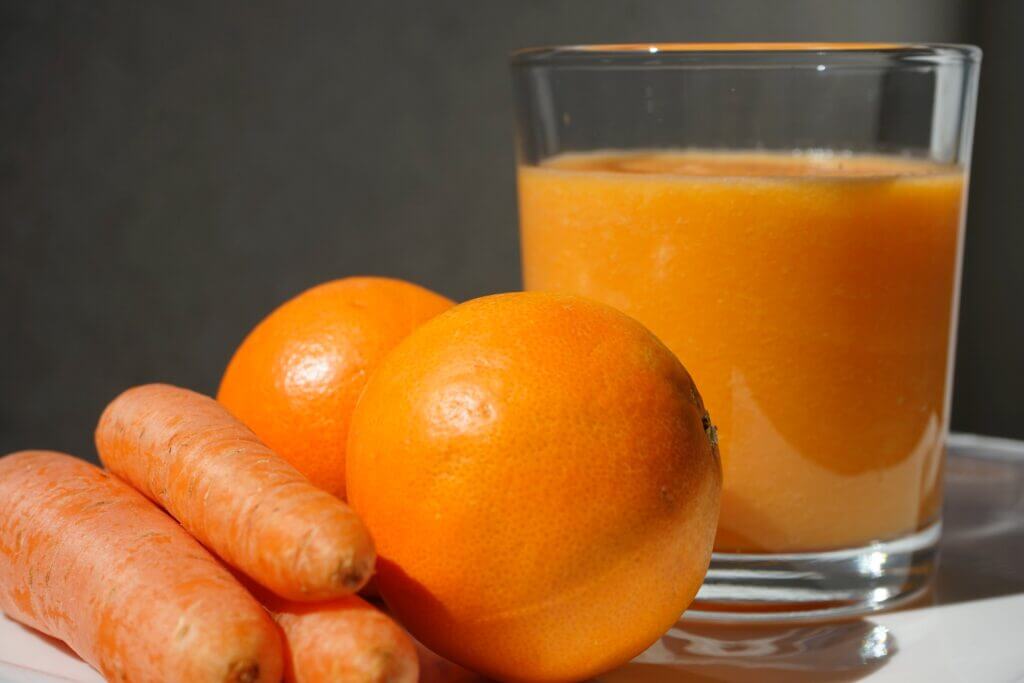
Now, let’s look at those essential antioxidants that should be added to your anti-aging diet to give your skin the best defense against the signs of aging.
Vitamin C
It is a go-to for anti-aging because vitamin C fights free radicals against premature aging, boosts collagen for smoother skin and gives you a bright even-toned skin.
Vitamin E
Vitamin E[10] shields skin from UV damage, locks in moisture to banish dryness and fine lines, and keeps your skin looking youthful by boosting elasticity. It’s like your skin’s secret weapon against aging!
Beta-Carotene (Vitamin A)
Beta-carotene[11] earns its spot in anti-aging lists because it’s the precursor to skin-loving vitamin A, defending against UV damage, preventing sunburn, and boosting cell turnover for a radiant complexion.
Selenium
Selenium is a key anti-aging ingredient, thanks to its antioxidant powers that shield skin from premature aging[12]. It teams up with vitamins E and C, boosting their effectiveness, while also promoting skin elasticity and minimizing fine lines.
Incorporating a variety of antioxidants into your skincare routine and diet can provide comprehensive protection against skin aging.
Fruits and Vegetables
Healthy eating for anti-aging includes incorporating a variety of fruits and vegetables into your diet. Additionally, fruits and vegetables promote anti-aging by providing essential vitamins, antioxidants[13], and hydration that protect skin cells, boost collagen production, reduce inflammation and wrinkles, and maintain a youthful complexion.
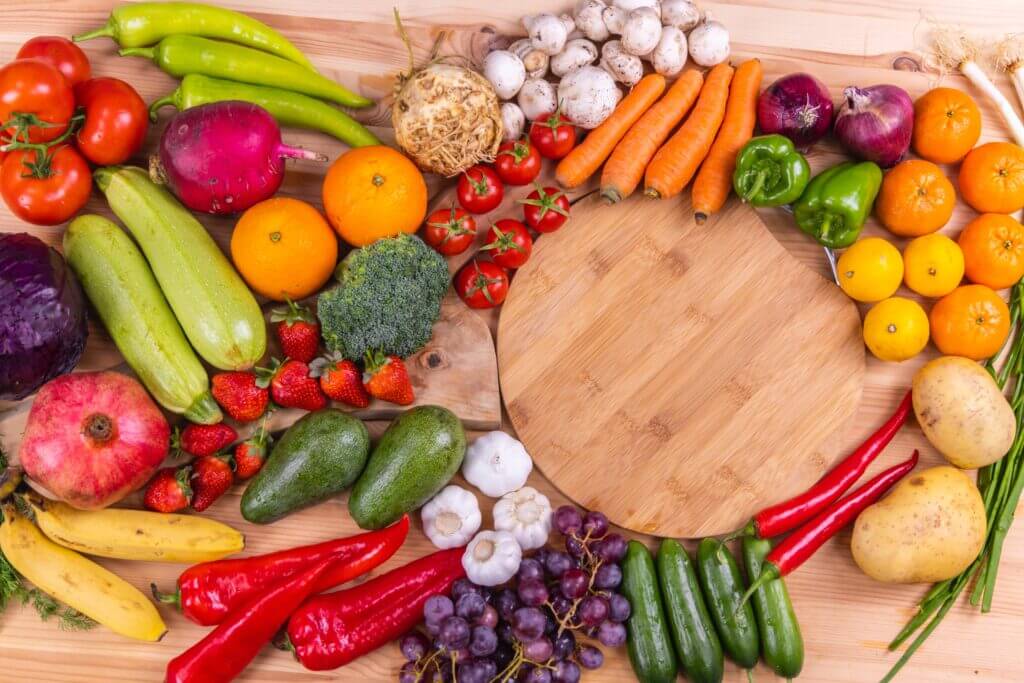
Fruits and veggies also have fiber and water, which help your stomach work well and keep your skin hydrated and hence reduces wrinkles and skin dullness. When your stomach works properly and your skin hydrates, you look younger and fresher. So, eating lots of fruits and veggies helps your skin stay healthy and helps you look younger.
Some of those amazing anti-aging fruits and vegetables include berries like blackberry, strawberry, blueberry, citrus fruits like oranges, lemon, lime, tomato, leafy greens like kale, spinach and even cruciferous vegetables like broccoli and cabbage.
Therefore, let’s explore the fruits and vegetables that give your skin the much-needed youthful glow.
Berries

Healthy eating for anti-aging includes recognizing the remarkable benefits of various types of berries[14] . Berries promote anti-aging due to their high antioxidant content, particularly vitamin C and phytochemicals. These antioxidants protect skin cells from damage, boost collagen production, support skin repair, and even out skin tone. This helps reduce wrinkles, fine lines, and age spots, contributing to a more youthful and vibrant complexion.
Let’s now explore the unique anti-aging qualities of different types of berries:
1. Blueberries
Blueberries are anti-aging[15] with their abundance of antioxidants, particularly vitamin C and phytochemicals. These antioxidants shield skin cells from damage caused by free radicals, stimulate collagen production, and support overall skin health. This helps reduce wrinkles, fine lines, and uneven skin tone, contributing to a more youthful and radiant appearance.
2. Strawberries
Strawberries have Vitamin C that sparks collagen production[16], keeping skin firm and reducing fine lines. Ellagic acid found in strawberries shields against harmful UV damage, preserving a youthful complexion. Plus, they’re rich in fiber which enhances digestive health, promoting overall well being.
3. Raspberries
Antioxidants like quercetin and ellagic acid found in raspberries[17] fight off free radicals. And Vitamin C enhances collagen for supple skin.
4. Blackberries
Anthocyanins and Vitamin C, found in blackberries[18], combat oxidative stress against the skin, preserving its youthful look. These antioxidants also contribute to brain health, preventing age-related cognitive decline.
5. Cranberries
The antioxidant, proanthocyanidins in cranberries[19] shield your skin from sun damage and prevent premature aging. And their anti-inflammatory powers can lower the chances of age-related health issues, making them not just a holiday treat, but great for your skin all-year.
Citrus Fruits

In the realm of healthy eating for anti-aging, citrus fruits stand out for their remarkable anbenefits. Citrus fruits support anti-aging through their high vitamin C content, a potent antioxidant, which protects skin cells from free radical damage, promotes collagen production for skin firmness, and helps even out skin tone. Moreover, it reduces the appearance of wrinkles and fine lines[20].This leads to a more youthful and radiant complexion.
Let’s look at some amazing anti-aging citrus fruits:
1. Oranges
Oranges aid in anti-aging due to their abundant vitamin C content. Vitamin C acts as a powerful antioxidant, protecting skin cells from free radical damage, promoting collagen production for skin elasticity, and reducing the appearance of wrinkles and fine lines. Hence oranges[21] contribute to a more youthful and vibrant complexion.
2. Lemons
Lemons are packed with vitamin C, which fights off skin-damaging[22] free radicals. Lemon juice also helps produce collagen for firmness, and brightens your complexion, reducing the look of wrinkles and giving you a youthful, radiant vibe.
3. Grapefruits
Grapefruits[23] fight aging with vitamin C, which combats skin damage, boosts collagen for elasticity, and evens skin tone, reducing wrinkles for a youthful look.
4. Limes
Limes contribute to anti-aging through their high vitamin C[24] content. Additionally, vitamin C stimulates collagen production, improving skin elasticity and reducing the appearance of wrinkles and fine lines, ultimately promoting a more youthful complexion.
Including various citrus fruits in your diet can provide a well-rounded approach to anti-aging, helping your skin stay healthy, smooth, and glowing.
Peach (Prunus Persica)
Peaches combat aging with antioxidants, vitamins, and anti-inflammatory agents. They promote collagen, protect against oxidative stress, ensure skin hydration, and soothe inflammation. peaches to your diet not only satisfies your taste buds but also helps your skin stay young and fresh.
Apricots
Apricots combat aging with antioxidants, collagen, and vitamins. Beta-carotene and nutrients in apricots maintain overall skin health, while apricot oil moisturizes, protects against UV damage, and supports a youthful complexion.
Tomatoes

Tomatoes fight wrinkles and support anti-aging with powerful antioxidants like lycopene, protecting the skin from UV damage and promoting collagen production. Lycopene[25] is a potent antioxidant that helps protect skin from UV damage and reduces the appearance of wrinkles, leading to a more youthful and healthy complexion.
Leafy Greens
Leafy greens aid in healthy eating for anti-aging thanks to their wealth of antioxidants[26] including vitamin E and C, vitamins, and minerals. Additionally, these nutrients protect skin cells, stimulate collagen production, and reduce inflammation, promoting skin elasticity and a youthful appearance.
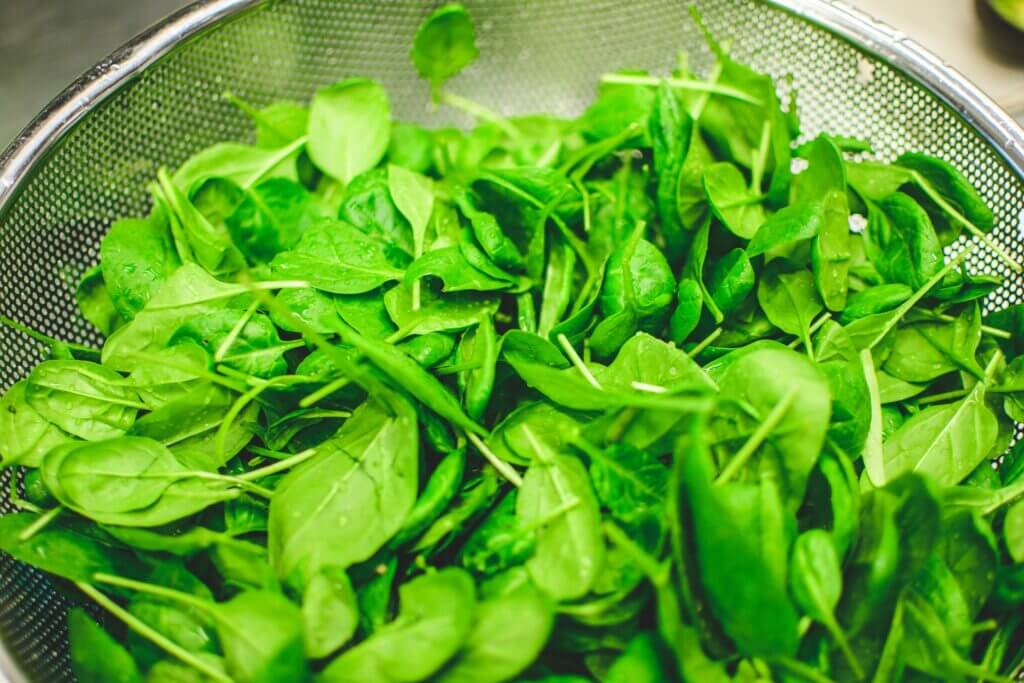
Let’s explore which leafy green is your go-to food for anti-aging:
1. Kale
Kale[27] supports anti-aging with its abundant antioxidants like vitamin E and C, vitamins, and minerals. These compounds protect skin cells from damage, boost collagen production, and reduce inflammation, improving skin elasticity and a more youthful appearance.
2. Spinach
Spinach benefits anti-aging and eye health with lutein, zeaxanthin, and beta-carotene. It also contains vitamin E for skin moisture and UV protection and iron for improved blood circulation, reducing fatigue and promoting healthy skin tone[28].
3. Swiss Chard
Swiss chard fights aging with alpha-lipoic acid, reducing wrinkles[29]. Its vitamin C supports collagen for youthful skin, while magnesium relaxes muscles, reducing stress-related aging signs.
4. Collard Greens
Collard greens are great for anti-aging[30] and skin health, with vitamin K for bones and skin integrity. They also offer vitamin C and beta-carotene to fight free radicals, reduce skin inflammation, and support detoxification for clearer, healthier skin.
Cruciferous Vegetables
Cruciferous vegetables like broccoli, cauliflower, Brussels sprouts, and cabbage promote healthy eating for anti-aging by offering a rich supply of antioxidants[31] (e.g., vitamin C, vitamin E, beta-carotene) that protect the skin from free radical damage, thus reducing wrinkles and fine lines.

They also support detoxification, boost collagen production for firmer skin, maintain hydration, and enhance the skin’s natural defence against harmful UV rays, collectively contributing to a more youthful and vibrant complexion.
Here’s the list of some delicious cruciferous vegetables that fight aging and give you that youthful glow:
1. Broccoli
Broccoli is rich in antioxidants like vitamin C and beta-carotene, which protect skin from premature aging[32] by neutralizing free radicals. Sulforaphane in broccoli has anti-inflammatory properties that help reduce skin inflammation, keeping it looking youthful.
2. Cauliflower
Cauliflower’s antioxidants, including vitamin C and manganese, combat oxidative stress, preventing skin damage and wrinkles[33]. Sulforaphane supports skin detoxification, promoting a clearer and more youthful complexion.
3. Brussels Sprouts
The high vitamin C content in Brussels sprouts promotes collagen production[34], maintaining skin’s firmness and reducing fine lines. Glucosinolates in Brussels sprouts have anti-inflammatory properties, which can prevent age-related skin conditions..
4. Cabbage
Cabbage has vitamin C that helps protect the skin from free radical damage[35], reducing the risk of age spots and wrinkles. Sulfur compounds in cabbage support skin detoxification, promoting clear and radiant skin.
Whole Grains
Whole grains like oats, quinoa, brown rice, and whole wheat are fundamental to a diet focused on healthy eating for anti-aging. They’re packed with essential vitamins and minerals, such as vitamin E and zinc, which protect against aging[36] by combating free radicals and supporting collagen production.
Additionally, their fiber content aids digestion, enhances nutrient absorption, and keeps the skin hydrated, reducing dryness and fine lines and wrinkles while promoting skin repair and a fresh, youthful appearance.
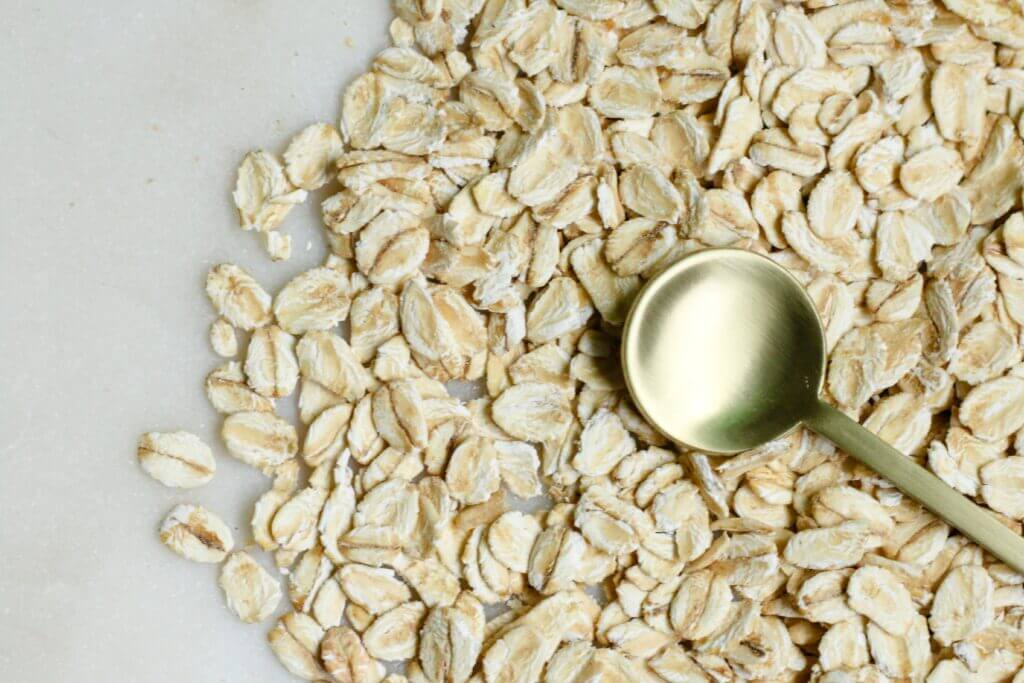
These anti-aging whole grains include oats, barley and whole wheat.
Now let’s take a closer look at those amazing whole grains that plays a key role in aiding anti-aging:
1. Oats
Oats are high in beta-glucans, which have anti-inflammatory properties that soothe irritated skin and reduce redness.They also contain zinc, known for its role in wound healing and maintaining skin health[37].
2. Barley
Barley is rich in antioxidants, including vitamin E, which protects the skin from UV damage and maintains a youthful complexion[38]. Its niacin content (vitamin B3) supports skin health by reducing redness and preventing dryness.
3. Whole Wheat
Whole wheat provides a range of B vitamins, including niacin and riboflavin, which support healthy skin and prevent dryness and inflammation. The selenium content in whole wheat helps protect skin cells from oxidative stress[39].
Including whole grains in your diet, like oats for breakfast or quinoa in salads, can give your skin the nutrients it needs for a radiant and age-defying complexion.
Lean Proteins
Lean proteins such as chicken breast, turkey, fish, tofu, and beans promote anti-aging by supporting collagen production[40], aiding in skin repair and regeneration, reducing inflammation, and providing protection against sun damage.
These proteins contribute to a fresher and more youthful complexion[41], making them vital building blocks for maintaining youthful skin.
1. Fish
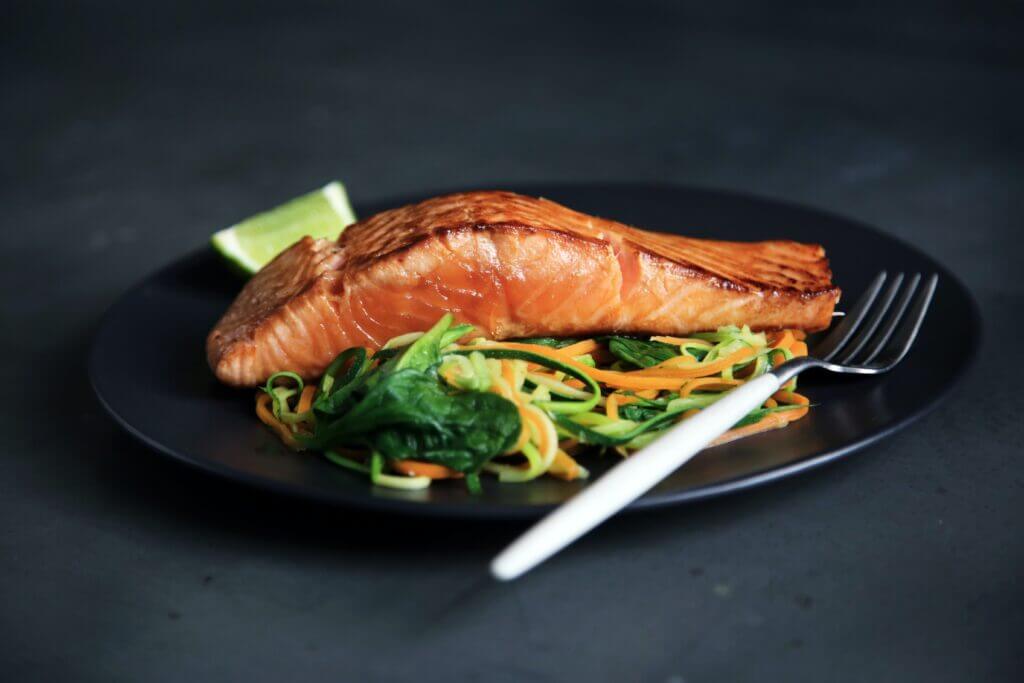
Fish, especially varieties like salmon, mackerel, and sardines, aid in healthy eating for anti-aging by providing a rich source of omega-3 fatty acids. Additionally, their omega-3 fatty acids[42] offer natural protection against sun damage, support collagen production for firm and hydrated skin, reduce inflammation, and improve skin texture. Incorporating these fish into your diet or taking fish oil supplements can help maintain a radiant and age-defying complexion.
Here are some amazing various types of fish:
1. Salmon
Salmon is rich in omega-3 fatty acids, particularly EPA and DHA[43], which help maintain skin’s moisture and elasticity, reducing the appearance of fine lines and wrinkles. Additionally, it also contains astaxanthin, a potent antioxidant that protects the skin from UV damage and premature aging.
Salmon’s protein content supports collagen production for smoother, youthful-looking skin.
2. Mackerel
Mackerel is another fatty fish high in omega-3 fatty acids, which reduce inflammation and soothe skin[44] conditions like redness and irritation. It’s a good source of vitamin B12, promoting skin cell turnover and a healthy complexion. Mackerel’s selenium content helps protect skin cells from oxidative stress and UV damage.
3. Sardines
Sardines[45] are rich in omega-3s, which support skin hydration and reduce dryness and flakiness. They contain coenzyme Q10 (CoQ10), an antioxidant that helps protect against free radical damage and maintain skin’s youthful appearance.
4. Tuna
Tuna is a good source of omega-3s, which reduce skin inflammation and promote an even skin tone. It contains selenium[46], which protects skin cells from oxidative stress and UV damage. Tuna’s niacin content (vitamin B3) helps maintain skin health and reduce redness.
2. Chicken
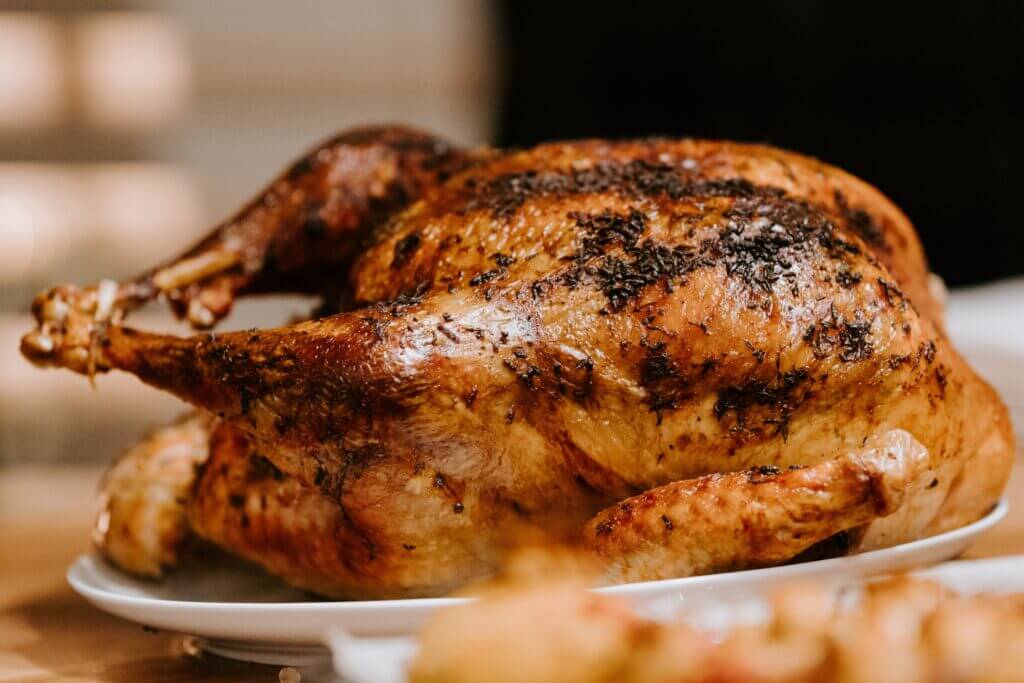
Chicken, especially in organic form, supports healthy eating for anti-aging by providing lean protein[47] rich in amino acids that promote collagen production for skin firmness, aid in skin repair, reduce inflammation, and maintain muscle mass. Therefore, choosing organic chicken ensures the best anti-aging benefits while minimizing potential harm to the skin and overall health, promoting a youthful appearance.
3. Beans
Beans, such as lentils and chickpeas, support anti-aging by offering plant-based protein[48] crucial for collagen production, antioxidants like vitamins C and E that protect the skin from damage, and fiber that aids in digestion, promoting skin hydration and reducing dryness and fine lines.

Now, let’s explore some amazing types of beans that can work wonders in your quest for youthful, radiant skin.
1. Chickpeas
Chickpeas, renowned for their protein content[49] and rich in essential amino acids, play a pivotal role in collagen synthesis. This nutritional synergy promotes skin firmness and elasticity, combating the visible signs of skin aging. They also provide vitamin B6, which regulates skin hormones, reducing the risk of acne breakouts. Chickpeas’ manganese content supports healthy skin by protecting against UV damage.
2. Kidney Beans
Kidney beans offer antioxidants like flavonoids and selenium, protecting the skin from premature aging caused by free radicals. They contain iron[50], aiding in oxygen transport to skin cells, preventing a pale complexion. Kidney beans’ fiber content supports digestive health, promoting clear and radiant skin.
Incorporating beans into your diet, whether in soups, salads, or as a side dish, can provide your skin with the necessary nutrients and antioxidants for a radiant and age-defying complexion.
3. Lentils
Lentils are packed with plant-based protein for collagen production, antioxidants (vitamins A and C) to prevent premature aging, dietary fiber for digestion and skin hydration, and a low glycemic index for stable blood sugar levels, reducing the risk of skin issues.
Incorporating lentils into your diet, whether in soups, stews, or salads, can provide your skin with a wealth of nutrients and antioxidants, helping you maintain a youthful and glowing complexion.
Healthy Fats
Healthy fats found in avocados, nuts, seeds, and olive oil contribute to healthy eating for anti-aging by maintaining hydration[51], providing antioxidants to combat free radicals, supplying omega-3 fatty acids for elasticity and reduced inflammation, aiding in collagen production, soothing skin irritation, and offering natural sun protection to prevent premature aging. These fats support a calm and youthful complexion.
These anti-aging healthy fats include olive oil, nuts and even avocado.
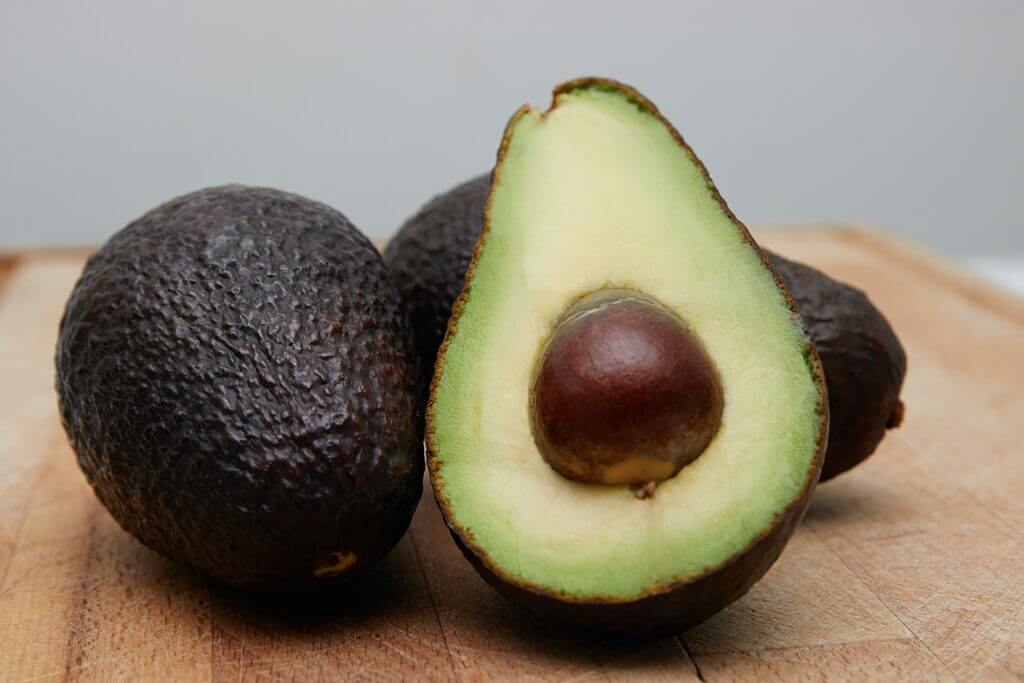
Here are those healthy fats to consider incorporating into your diet for a radiant and age-defying appearance:
1. Olive Oil
Olive oil is rich in monounsaturated fats and antioxidants, including vitamin E and polyphenols, which protect the skin from oxidative damage causing aging. It contains oleic acid[52], which helps maintain skin moisture, reducing dryness and the appearance of fine lines. Olive oil’s anti-inflammatory properties can calm irritated skin and prevent redness and puffiness.
2. Nuts
Nuts provide healthy fats, such as monounsaturated and polyunsaturated fats[53], which support skin moisture and elasticity. They are rich in vitamin E, an antioxidant that protects skin cells from UV damage and premature aging. Nuts contain zinc, promoting skin health and wound healing.
3. Avocado
Avocado is a source of monounsaturated fats, which help maintain skin moisture and reduce the risk of dryness and wrinkles. It provides vitamin E, which protects the skin from free radical damage[54] and supports a youthful complexion. They can also be utilized in a DIY avocado anti-aging mask, enhancing its benefits for skin health and rejuvenation. Its folate content supports DNA repair and skin cell regeneration.
Superfoods
Fruits and Vegetables
Healthy eating for anti-aging involves incorporating nutrient-rich superfoods into your diet to promote overall well-being and youthful skin. Superfoods are full of antioxidants (like vitamins C and E) that protect your skin from damage and reduce signs of premature aging. These superfoods also help make collagen, repair and hydrate your skin and have anti-inflammatory and skin-brightening powers and even protects against premature aging.
The must-have anti-aging superfoods fruits and vegetables include acai berry, goji berry and pomegranates.

Now, let’s check them out:
Acai Berries
Acai berries are antioxidant-rich, protecting skin from damage. They boost collagen with vitamins A, C, and E[55], maintaining skin’s moisture with healthy fats, and soothing inflammation for a youthful complexion.
Goji Berries
Goji berries are packed with antioxidants like vitamin C, essential amino acids for collagen production[56], and skin-renewing vitamin A. They’re anti-inflammatory, calming irritation for youthful skin.
Pomegranates
Pomegranates, rich in polyphenols and anthocyanins, protect against oxidative stress[57] and UV damage. They boost collagen with vitamin C for firmer skin, maintain hydration, and soothe irritation for an even complexion.In addition, utilizing pomegranate peels in skincare routines can harness their powerful antioxidant properties, contributing to enhanced protection against oxidative stress, UV damage, and overall skin health.
Whole Grains

Superfood whole grains are rich in vitamins, minerals, and antioxidants[58] like vitamin E that protect and revitalize your skin. They promote collagen production, maintain skin firmness, and aid in repair and regeneration, ensuring a youthful appearance.
Those superfood whole grains include brown rice, quinoa, buckwheat, teff, and amaranth that do anti-aging wonders for the skin.
Let’s explore those superfood whole grains:
Brown Rice
Brown rice is a skin-friendly choice, thanks to its vitamins B6 and B3[59], which boost collagen production, reduce redness, and combat inflammation. It’s also packed with antioxidants like selenium, protecting skin from aging-related oxidative damage. The high fiber content supports digestion and detoxification, enhancing skin clarity and radiance.
Quinoa
Quinoa, a complete protein source, supplies essential amino acids crucial for collagen production[60], enhancing skin elasticity and reducing wrinkles. It also contains riboflavin (vitamin B2) for healthy skin, preventing dryness and flakiness. Quinoa’s magnesium content supports skin hydration, potentially minimizing fine lines.
Buckwheat
Buckwheat is rich in antioxidants like rutin and quercetin[61], shielding skin cells from free radicals and delaying premature aging. It also offers essential amino acids for collagen production, enhancing skin firmness and reducing wrinkles.
Buckwheat’s magnesium content supports skin hydration, preventing dryness and flakiness. Additionally, its anti-inflammatory properties calm irritated skin and reduce redness for a youthful complexion.
Teff
Teff is an excellent choice for skin health, containing essential amino acids like lysine for collagen production[62], reducing fine lines. It also provides iron for oxygen transport to skin cells, maintaining a healthy complexion. Teff’s calcium supports skin and bone health, and its zinc aids in skin health and wound healing.
Amaranth
Amaranth is a skin-friendly grain rich in antioxidants like vitamin E and polyphenols[63], delaying premature aging. It provides essential amino acids for collagen production, reducing wrinkles. Amaranth’s folate supports DNA repair and skin cell turnover, while its anti-inflammatory properties calm irritated skin and reduce redness and puffiness, ultimately making it to the list of healthy eating for anti-aging.
Legumes

Superfood legumes are collagen-boosting, antioxidant-rich, and digestion-promoting[64], helping maintain youthful skin by reducing wrinkles, defending against free radicals, and preventing dryness and fine lines making them valuable components of a diet focused on healthy eating for anti-aging.
Here’s a list of legumes superfoods.
Black Beans
Black beans are a skin-friendly choice, offering antioxidants like anthocyanins to combat free radicals and protect skin from oxidative damage[65]. Their zinc content promotes skin health and wound healing, while their protein supports collagen production, reducing fine lines and wrinkles.
Edamame
Edamame, or young soybeans, are an antioxidant powerhouse with isoflavones that combat free radicals[66], preventing skin cell damage and premature aging. They contain vitamin C for collagen production and skin elasticity, reducing wrinkles. Edamame’s protein content supports healthy skin by providing essential amino acids needed for collagen synthesis.
Pinto Beans
Pinto beans are a skin-protecting choice, providing antioxidants like flavonoids and selenium[67] to combat oxidative stress and free radical damage. Their iron content aids in oxygen transport to skin cells, preventing a pale complexion. Pinto beans’ protein supports collagen synthesis for skin firmness and elasticity, while their fiber promotes digestive health, contributing to clear and healthy skin.
Nuts and Seeds
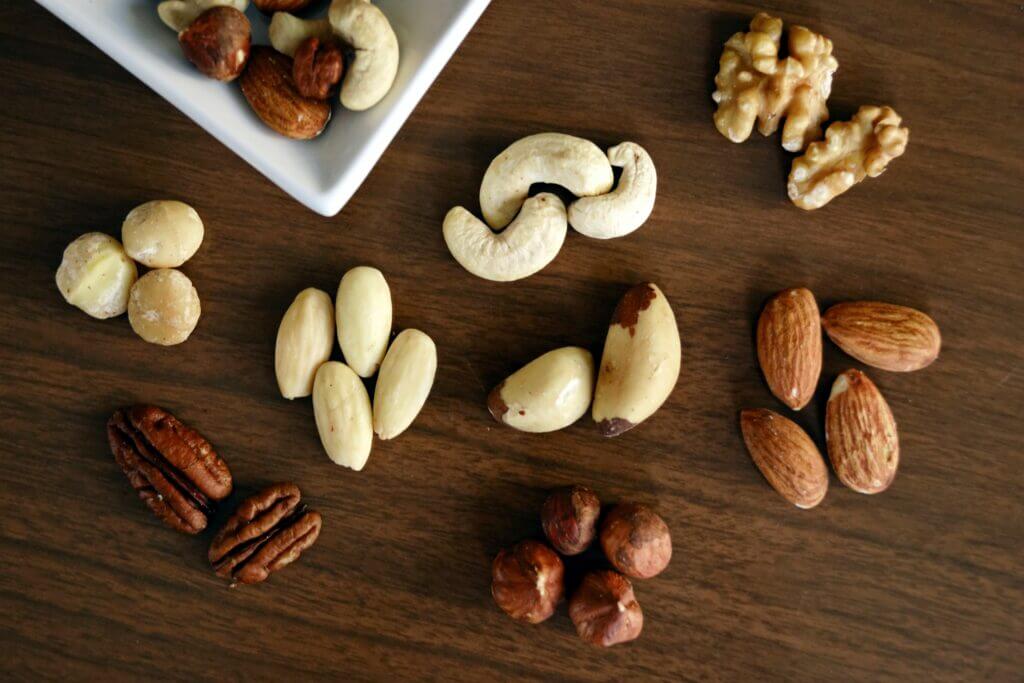
Superfood nuts and seeds, like almonds and flax seeds, offer healthy fats for skin hydration, antioxidants for anti-aging defense[68], omega-3s for skin health, collagen support, and anti-inflammatory benefits, promoting a youthful complexion.
Let’s explore some superfood nuts and seeds that can be your skin’s best friends.
Almonds
Almonds support anti-aging by nourishing skin with vitamin E, omega-3 fatty acids, and minerals for collagen production and hydration. They are abundant in antioxidants[69], bolster skin health, and reduce signs of aging. Their monounsaturated fats support heart health, while fiber aids digestion—a holistic approach to healthy aging. Enjoy almonds in moderation for their anti-aging advantages.
Walnuts
Walnuts offer potent anti-aging benefits with omega-3s for brain health[70], antioxidants like vitamin E for wrinkle-free skin, and biotin for strong hair and nails. Enjoy these age-defying benefits with a handful of walnuts daily.
Chia Seeds
Chia seeds are rich in antioxidants that protect skin cells, amino acids that support collagen for skin firmness[71], omega-3s for moisture and wrinkle prevention, and anti-inflammatory properties for a calm complexion.
Flaxseeds
Flaxseeds are an anti-aging powerhouse, thanks to their high levels of lignans, a potent antioxidant. These lignans help combat free radicals[72], supporting youthful skin and overall health. Moreover, with brain-boosting omega-3s and heart-healthy benefits, flaxseeds are an essential addition to your anti-aging regimen.
Dairy Products
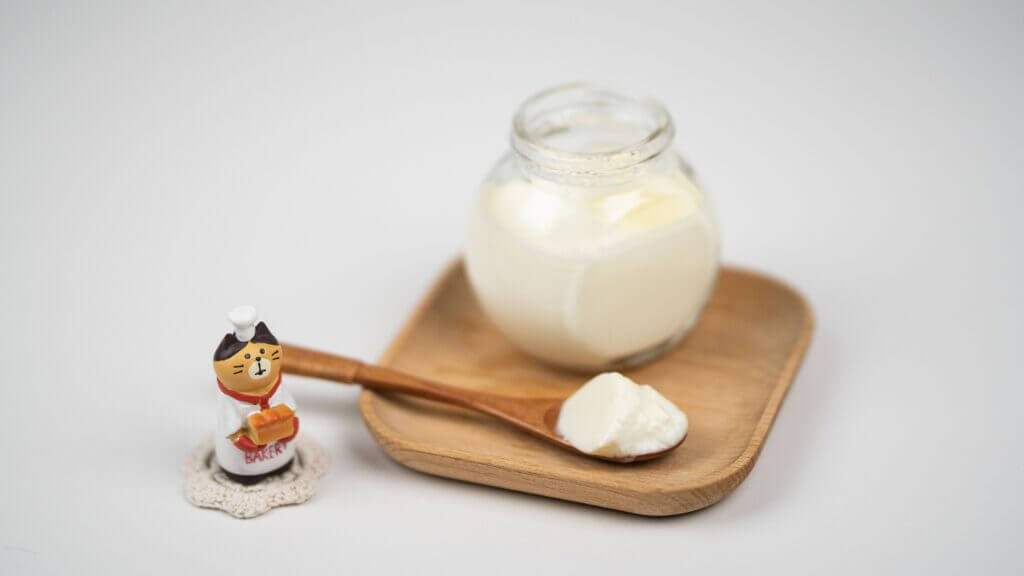
Next on our healthy eating for anti-aging list, Superfood dairy products, like Greek yoghurt and kefir, support collagen production for skin elasticity[73], provide probiotics for a healthy gut and improved skin health, and offer essential vitamins and minerals to maintain healthy eating for anti-aging.
Some of those amazing anti-aging dairy products include yogurt, kefir and cottage cheese.
Let’s explore those flavorful spices and herbs that can help in making all your healthy eating for anti-aging dreams come true.
Yogurt
Yogurt’s probiotics support gut health for clearer skin, its protein aids collagen production[74] for firmness, lactic acid exfoliates for smoother skin, and calcium aids in cell turnover and repair, promoting skin health.
Kefir
Kefir is a fermented dairy product, similar to yogurt but thinner in consistency, known for its anti-aging benefits. It aids in anti-aging by promoting a healthy gut-skin axis, collagen synthesis, and providing antioxidants through its rich composition of probiotics, peptides, vitamins, and minerals. Probiotics support gut health, vitamins B2 and B12 aid skin regeneration[75], protein promotes collagen for fewer lines, and AHAs exfoliate for smoother skin.
Cottage Cheese
Cottage cheese’s protein aids collagen for firm skin[76], selenium defends from UV damage, vitamin B12 supports cell renewal, and calcium promotes skin repair.
Spices and Herbs

Superfood spices and herbs, like turmeric and cinnamon, offer antioxidants to combat aging[77], anti-inflammatory properties for a calm complexion, and skin-brightening effects to reduce dark spots and uneven skin tone.
The anti-aging spices and herbs include turmeric, ginger, black garlic, cinnamon and cayenne pepper,
Let’s explore those flavorful spices and herbs that can help in making all your anti-aging dreams come true.
Turmeric
Turmeric has curcumin which reduces wrinkles and promotes youthful skin by neutralizing free radicals and soothing inflammation. Moreover, it boosts collagen production, reducing wrinkles, and soothes irritated skin, promoting a youthful complexion.
Ginger
Ginger aids anti-aging through its antioxidants, like gingerol, countering free radicals, reducing inflammation, and promoting collagen production for firmer, smoother skin. It boosts blood circulation, nourishing skin for a healthy, radiant look.
Black Garlic
Derived from fermented regular garlic, black garlic helps combat oxidative stress, reduces inflammation, and promotes skin health. It may have enhanced antioxidant properties due to the fermentation process.
Cinnamon
Cinnamon is loaded with antioxidants that combat premature aging, has antimicrobial properties for clearer skin, and enhances blood circulation, promoting a natural skin glow.
Cayenne Pepper
Cayenne pepper’s capsaicin soothes skin, boosts blood circulation[78] for a healthy complexion, and provides antioxidants to prevent premature aging.
Honey
Honey helps in anti-aging by stimulating collagen, reducing wrinkles, and providing antioxidants and enzymes essential for skin health. The choice of raw honey preserves higher antioxidant levels, while Manuka honey supports wound healing with its high methylglyoxal content. The natural properties of honey contribute to anti-aging effects, promoting a more youthful complexion.
Anti-Aging Drinks
Healthy eating for anti-aging isn’t limited to solid foods; it also includes beverages that can provide a refreshing and delicious way to promote youthful skin and overall well-being. Anti-aging drinks like antioxidant-rich juices, skin-loving teas, and coffee contain nutrients that combat free radicals, reduce inflammation, boost collagen, and promote youthful skin. Enjoy these beverages for a refreshing way to support your skin’s health and overall well-being.
Let’s look at some of those yummy anti-aging drinks:
Juices
Anti-aging juices are a tasty and nutritious way to support youthful skin[79] from the inside out. They’re packed with essential nutrients and antioxidants that combat signs of aging and promote overall well-being.

Let’s explore some potent options:
Green Juice
Green juice fights aging with vitamins C and E, promotes collagen[80], and soothes skin for a youthful look.
Pomegranate Juice
Pomegranate juice combats aging with antioxidants, boosts collagen, and soothes skin[81] for a youthful look.
Berry Juice
Berry juices fight aging with antioxidants, even skin tone, and keep skin hydrated[82] for a youthful look.
Beet Juice
Beet juice, packed with antioxidants and vitamins like vitamin C and folate, promotes collagen[83] production for firmer skin, aids detoxification for clearer skin, and reduces inflammation.
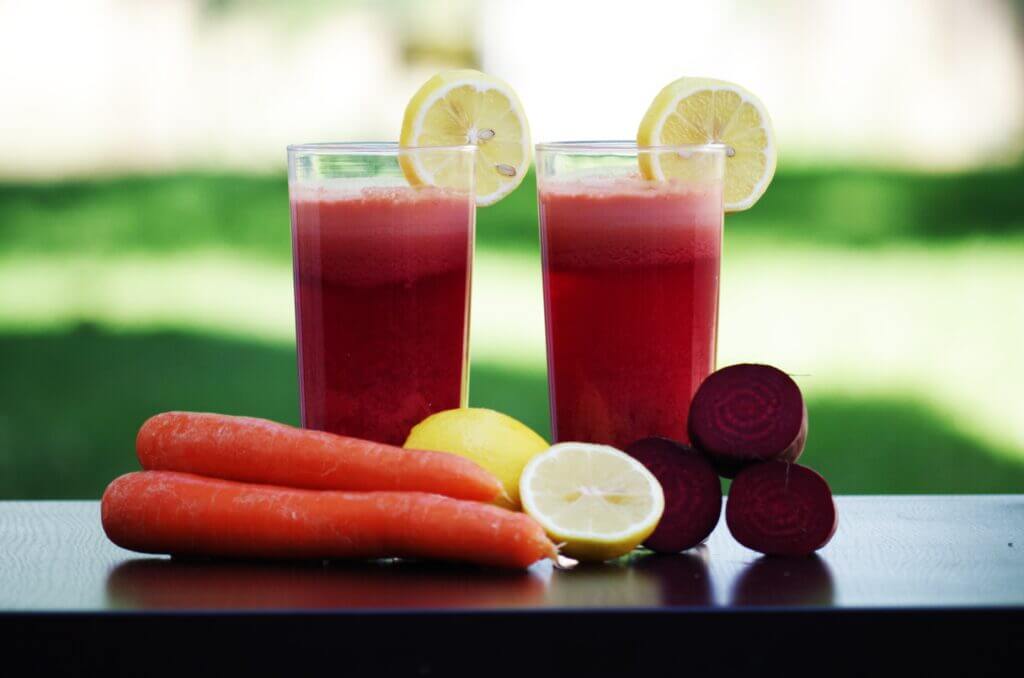
Watermelon Juice
Watermelon juice, thanks to its hydrating properties and vitamins A and C[84], supports skin cell turnover, provides lycopene for protection against UV damage, and keeps the skin well-hydrated to reduce dryness.
Carrot Juice
Carrot juice is rich in beta-carotene, a precursor to vitamin A[85], which protects the skin from UV damage, aids in skin cell turnover, and promotes a youthful complexion.
Orange Juice
Orange juice is packed with vitamin C, a powerful antioxidant that shields skin cells from oxidative stress and supports collagen production for firmer, wrinkle-reduced skin[86]. Its anti-inflammatory properties can also soothe irritated skin and reduce redness.
Tomato Juice
Next on our healthy eating for anti-aging list, tomato juice contains lycopene, a potent antioxidant[87] that safeguards the skin from free radicals and UV damage, aiding in delaying signs of aging. Its support for collagen production enhances skin elasticity and maintains a youthful appearance, while its anti-inflammatory properties can reduce skin redness and inflammation.
Teas
Healthy eating for anti-aging also includes teas, like green tea and herbal infusions, are not only soothing and delicious but also brimming with antioxidants, polyphenols, and other skin-friendly compounds. These brews work from within to combat the signs of aging, offering a secret to a youthful and vibrant complexion and overall well-being.
Let’s explore these amazing types of tea:
Green Tea
Green tea is an antioxidant-rich beverage with catechins that combat free radicals, minimizing wrinkles, promoting collagen for elasticity, and soothing skin inflammation, contributing to a youthful complexion.
Matcha Tea
Matcha tea is a vibrant green powdered tea made from finely ground young tea leaves. It’s a potent source of antioxidants[89], particularly EGCG, that protect against UV damage and premature aging. It contains chlorophyll for detoxification and clearer skin.

Turmeric Tea
Turmeric tea, with curcumin, offers antioxidant and anti-inflammatory benefits, protecting skin cells, promoting collagen for elasticity, and soothing irritation.
Ginger Tea
Ginger tea’s antioxidants fight skin cell damage, gingerol reduces inflammation and redness, and improved circulation adds a healthy glow.
Hibiscus Tea
Hibiscus tea is a vibrant, ruby-colored infusion made from the dried petals of the hibiscus flower. Its antioxidants protect skin, reduce pigmentation[90], and promote hydration for a youthful complexion.
Rooibos Tea
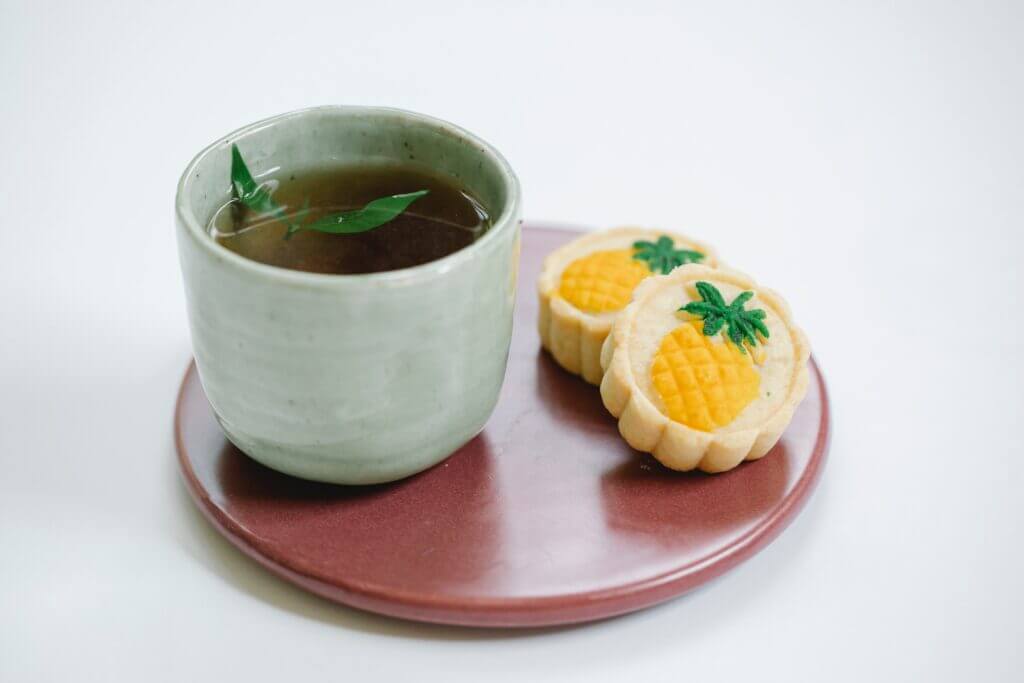
Rooibos tea, also known as red tea, is a caffeine-free herbal infusion derived from the leaves of the South African rooibos plant. It offers potent anti-aging benefits with aspalathin antioxidants[91], collagen support, and anti-inflammatory properties, all contributing to a youthful complexion.
Black Tea
Black tea, filled with theaflavins and thearubigins antioxidants, enhances collagen production and fights oxidative stress, effectively minimizing fine lines and soothing skin irritation.
Oolong Tea
Oolong tea is a semi-oxidized tea variety with a delightful balance between green and black tea. Hence, rich in antioxidants, boosts collagen production and protects against oxidative damage, promoting firm, youthful skin and reducing inflammation.
Coffee
Coffee is not just a morning ritual, it offers anti-aging benefits. It aids in anti-aging through its rich antioxidants, collagen-stimulating elements, improved blood circulation, anti-inflammatory properties, and potential sun protection benefits.
Here are some different types of coffee:
Black Coffee

Black coffee’s chlorogenic acids combat free radicals, potentially reducing skin aging. Its caffeine can enhance blood circulation and metabolic rate for a healthy weight and complexion.
Coffee with Milk
Coffee with milk combines coffee’s antioxidants with milk’s calcium for skin cell turnover. Milk protein can enhance skin elasticity, reducing wrinkles for a youthful look.
Coffee with Cream and Sugar

Cream and sugar in coffee can add calories and fats, potentially contributing to weight gain and aging signs. Moreover, excess sugar may stiffen collagen, causing sagging and wrinkles. Healthier options like almond milk or stevia can be better choices.
Kefir
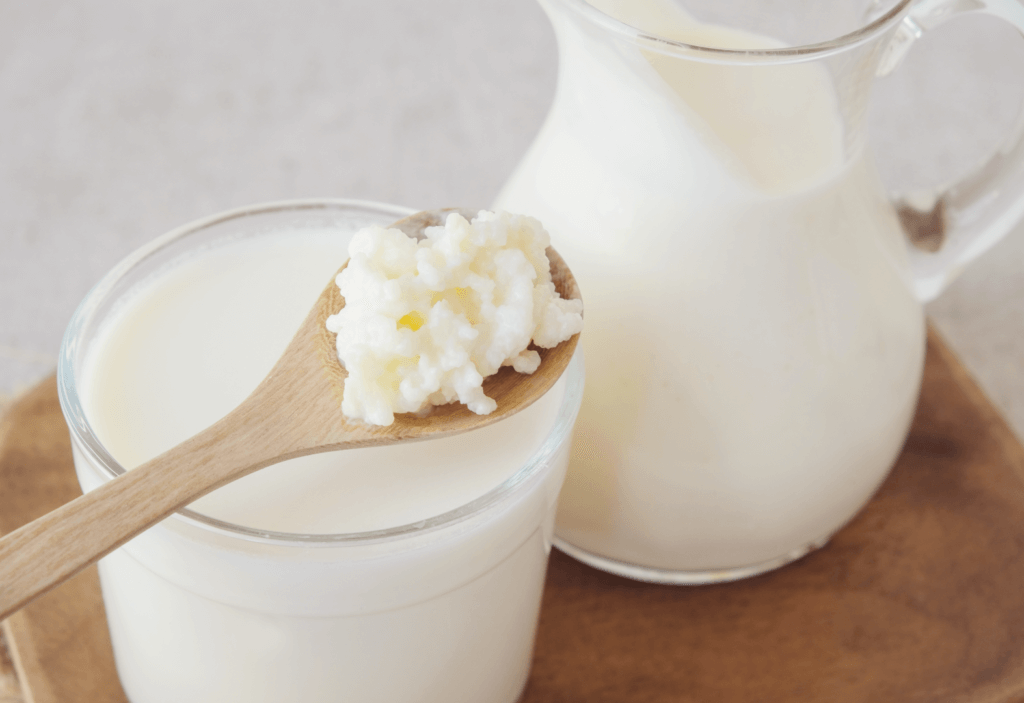
Kefir, a fermented dairy product, promotes a healthy gut, aiding nutrient absorption and potentially benefiting your skin. Probiotics in kefir aid detoxification, reducing skin issues. Vitamins like K and calcium support skin health and cell repair.
Kombucha
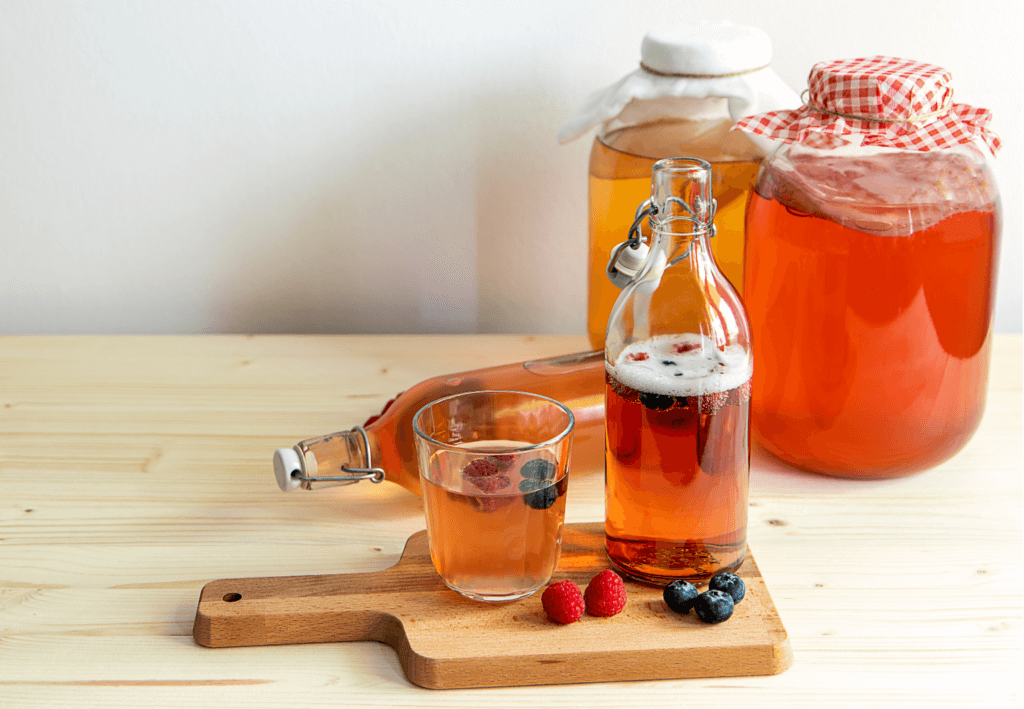
This fizzy drink is created through the fermentation of sweet tea with a SCOBY (Symbiotic Culture of Bacteria and Yeast). Kombucha aids gut health, potentially benefiting skin[92]. Its antioxidants combat free radicals, reducing skin aging. Kombucha’s detox properties help remove skin-damaging toxins, hence it is included in our healthy eating for anti-aging list.
Coconut Water
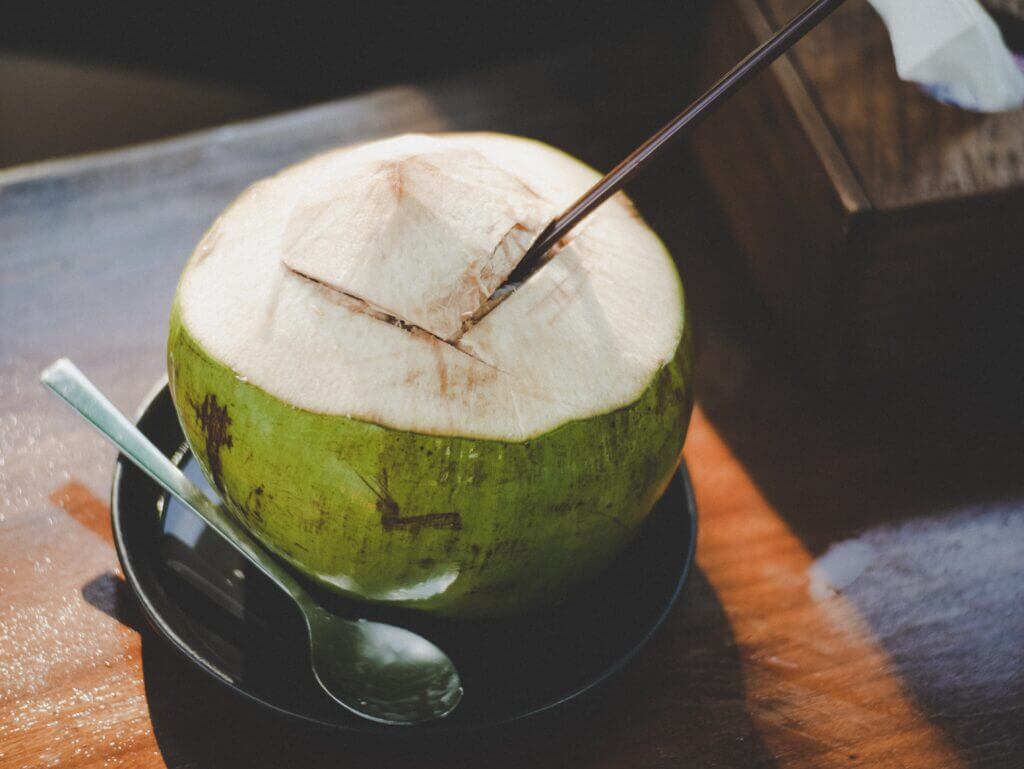
Coconut water is a natural skin hydrator, rich in electrolytes for moisture retention and potassium for a radiant complexion. It’s also loaded with antioxidants to combat premature aging[93].
Smoothies
Customizable smoothies can enhance skin health with ingredients like berries for antioxidants, leafy greens for collagen support, yogurt for probiotics and protein, and flaxseeds for omega-3s, all promoting a youthful complexion.
What’s Healthy Eating for Anti-Aging without Hydration?
Hydration is a powerful anti-aging tool because it keeps skin moist, reduces wrinkles, supports collagen, strengthens the skin’s barrier, aids detox, boosts cell turnover, and promotes an even skin tone. To harness these benefits, it’s essential to focus on both water intake and a diet rich in hydrating foods, complemented by moisturizing skincare routines, for a youthful and vibrant appearance.
Anti-Aging Diets

Healthy eating for anti-aging focuses on nutrient-dense foods like antioxidant diets, healthy fats, lean proteins, hydration, whole grains, and probiotics while limiting sugar and processed foods. Proper portions, regular exercise, quality sleep, and personalization are key components to support skin health and overall well-being.
Let’s look at some of the popular anti-aging diets:
Mediterranean Diet
The Mediterranean diet emphasizes fruits, veggies, whole grains, lean proteins, and olive oil[94]. It’s rich in antioxidants and healthy fats, protecting against oxidative stress and promoting skin health. Fish, nuts, and colorful produce support collagen production and skin elasticity, contributing to its anti-aging benefits.
DASH Diet (Dietary Approaches to Stop Hypertension)
The DASH diet, aimed at reducing hypertension and heart disease risk, includes fruits, veggies, whole grains, lean proteins, and low-fat dairy. It offers anti-aging benefits by providing potassium for pH balance[95], reducing sodium to prevent puffiness, and supporting collagen production for skin health.
Okinawa Diet
The Okinawa diet, inspired by centenarians in Okinawa, focuses on longevity and health[96]. It includes colorful veggies, especially beta-carotene-rich sweet potatoes, and seafood with omega-3s for skin. Although it doesn’t have any direct anti-aging benefits, portion control and moderate calories promote healthy weight and clearer skin.
MIND Diet (Mediterranean-DASH Diet Intervention for Neurodegenerative Delay)
The MIND diet, merging Mediterranean and DASH diets for brain health, also offers anti-aging benefits[97]. It includes antioxidants from berries, nutrients from leafy greens, healthy fats and vitamin E from nuts, olive oil’s protection, and fatty fish for skin health.
Benefits and Drawbacks of Anti-Aging Diets
Anti-aging diets often emphasize nutrient-rich foods and antioxidants that can help reduce the signs of aging, enhance skin health, and promote longevity. However, while there are significant benefits, it’s essential to weigh them against potential drawbacks.
Here are some benefits and drawbacks of anti-aging diets:
| Diet | Benefits | Drawbacks |
|---|---|---|
| Mediterranean Diet | Rich in antioxidants and healthy fats | May require extra cost for specific foods |
| Supports heart health and skin elasticity | Adherence can be challenging for some | |
| DASH Diet | Reduces hypertension and heart disease risk | Monitoring sodium intake can be tedious |
| Provides nutrients for skin health | Adaptation to lower sodium may be tough | |
| Okinawa Diet | Promotes longevity and healthy eating | Limited direct scientific evidence |
| Encourages portion control for a healthy weight | Requires discipline in portion control | |
| MIND Diet | Supports brain health with antioxidants | Focuses less on direct anti-aging effects |
| Promotes healthy skin with nutrient-rich foods | Dietary choices may need specific attention |
How to Choose An Anti-Aging Diet
To select the appropriate healthy eating for anti-aging diet, it’s essential to follow a deliberate approach. Define your goals and consult a healthcare professional for personalized guidance. Consider your lifestyle, dietary components, and preferences while aiming for balance. Gradually transition, monitor progress, seek support if needed, prioritize hydration, and stay informed about the latest nutrition research for flexibility and safety.
Foods to Avoid
To support an anti-aging lifestyle, it’s important to limit or avoid certain foods and habits that can contribute to premature aging and skin damage.
Hence, here is the list of foods you should say no to before getting on your anti-aging journey:
Sugary Foods
Excessive sugar intake can accelerate aging, especially affecting skin health through glycation. Sugar molecules binding to collagen fibers can cause fine lines, wrinkles, and sagging skin.
To maintain a youthful appearance and overall health, here are the sugary foods you should limit or avoid sugary:
Soda
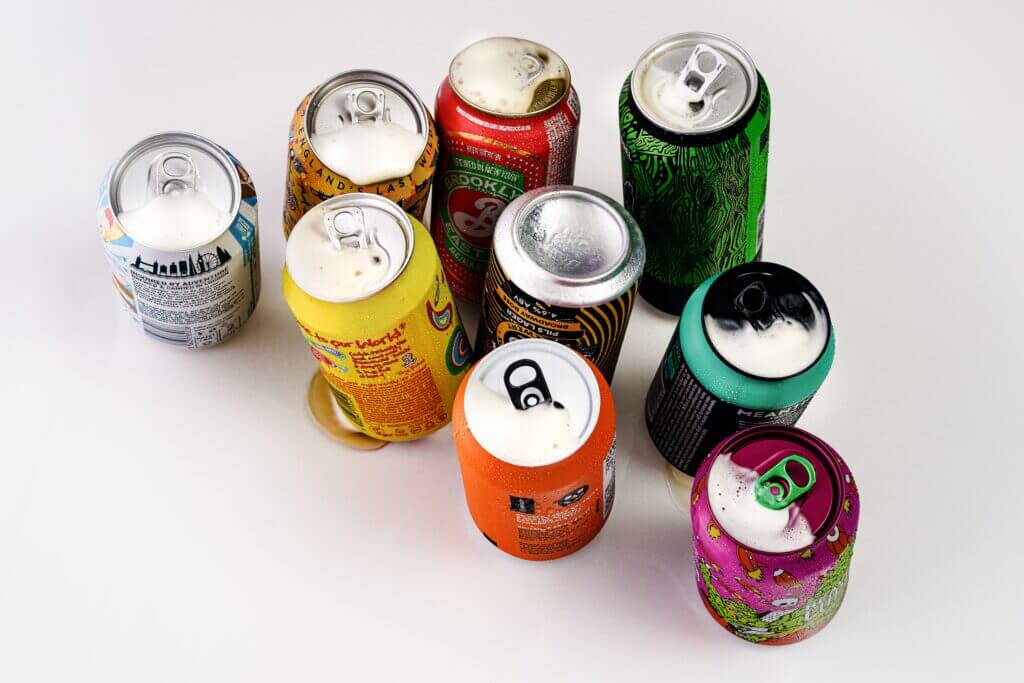
Soda is loaded with added sugars and provides little to no nutritional value. Therefore, regular consumption can contribute to weight gain and skin issues[98] due to its high sugar content.
Candy and Sweets
Candies, chocolates, and other sweet treats are often high in sugars and offer little in terms of essential nutrients. Overindulging in these can lead to spikes in blood sugar levels, potentially harming skin elasticity.
Sweetened Breakfast Cereals
Many breakfast cereals marketed to children are packed with added sugars. However, excessive sugar in the morning can result in energy crashes and may negatively affect skin health.
Processed Snacks
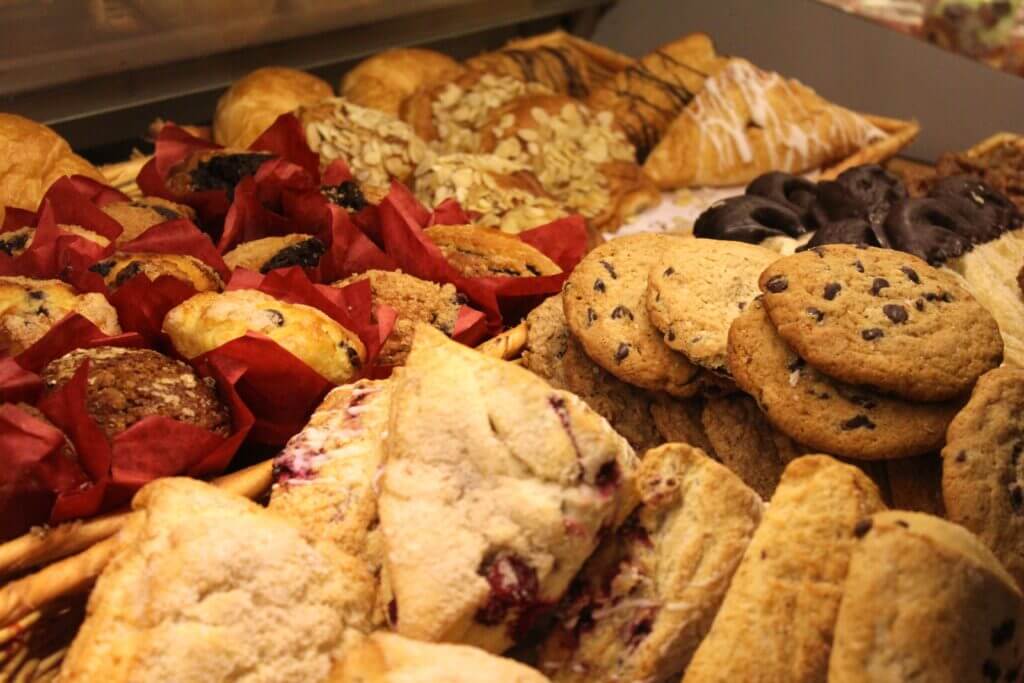
Processed snacks like cookies, cakes, and flavored chips often contain hidden sugars[99]. These snacks can contribute to glycation, inflammation, and premature aging when consumed regularly.
Pastries and Baked Goods
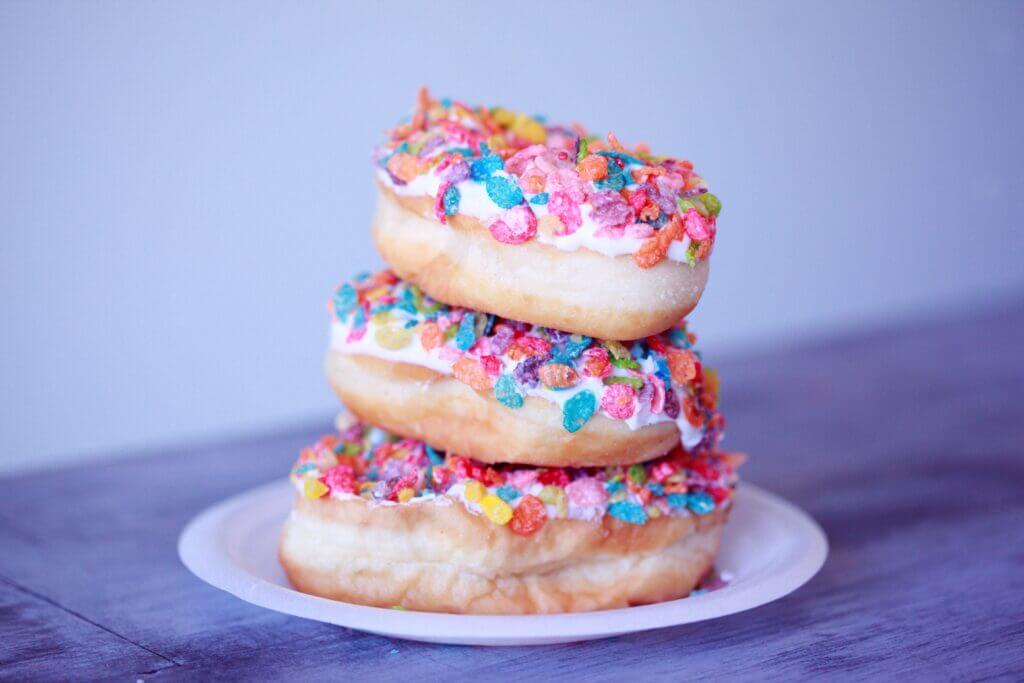
Pastries, muffins, and baked goods are frequently high in sugar and unhealthy fats. Therefore, the combination of sugars and trans fats in these items can lead to skin issues and inflammation.
Excessive Alcohol

Excessive alcohol consumption can negatively impact anti-aging efforts, affecting both skin and overall health. Alcohol’s diuretic nature leads to skin dehydration and reduced elasticity. It contributes to skin inflammation, worsening conditions like acne and rosacea. Additionally, alcohol can hinder nutrient absorption essential for skin health and disrupt sleep patterns crucial for skin repair.
To support your healthy eating for anti-aging goals, limit alcohol intake to moderate levels or consider abstaining, adopting a mindful approach for youthful skin and overall health.
High-Sodium Foods
High sodium foods can have adverse effects on your skin’s appearance and overall anti-aging efforts. Sodium, a key component of salt, can cause water retention in the body, leading to puffiness, especially in the facial area. Over time, excessive sodium intake can contribute to premature aging and skin issues[100]. To support a more youthful complexion and overall health, it’s important to be mindful of and limit high sodium foods.
Here are some high sodium foods to be cautious of:
Fast Food
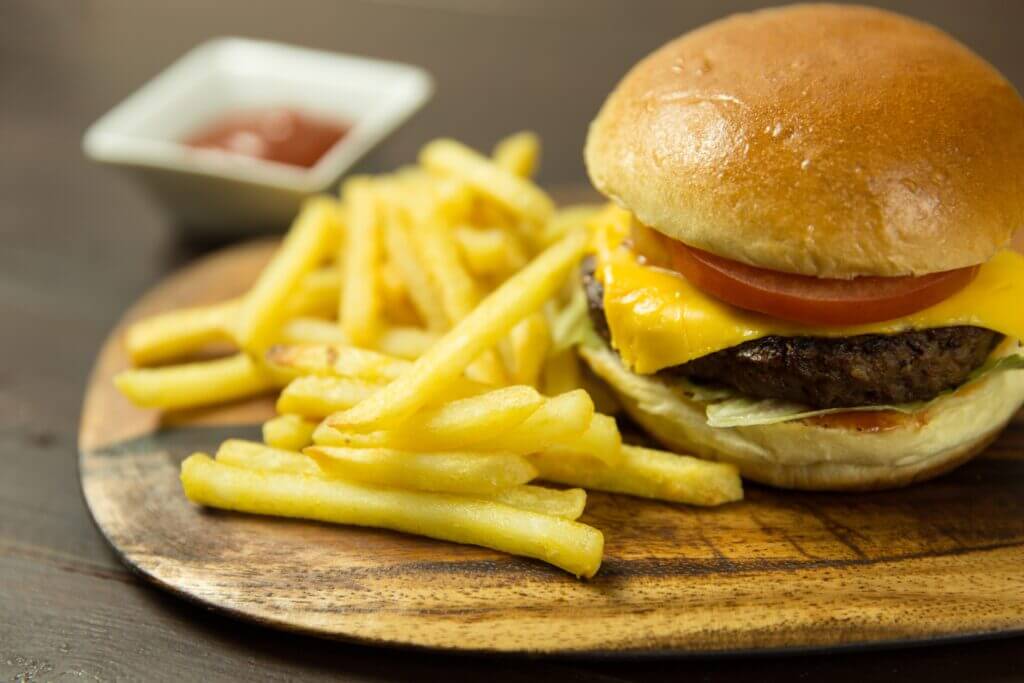
Fast food items, such as burgers, fries, and pizza, often contain high levels of sodium due to added salt for flavor enhancement. Frequent consumption of fast food can contribute to water retention and may lead to skin puffiness.
Canned Soups and Sauces
Many canned soups, sauces, and ready-made meals are loaded with sodium to extend shelf life and enhance taste. Therefore, consistently eating high-sodium canned foods[101] can result in bloating and may negatively affect skin texture.
Instant Noodles and Ramen
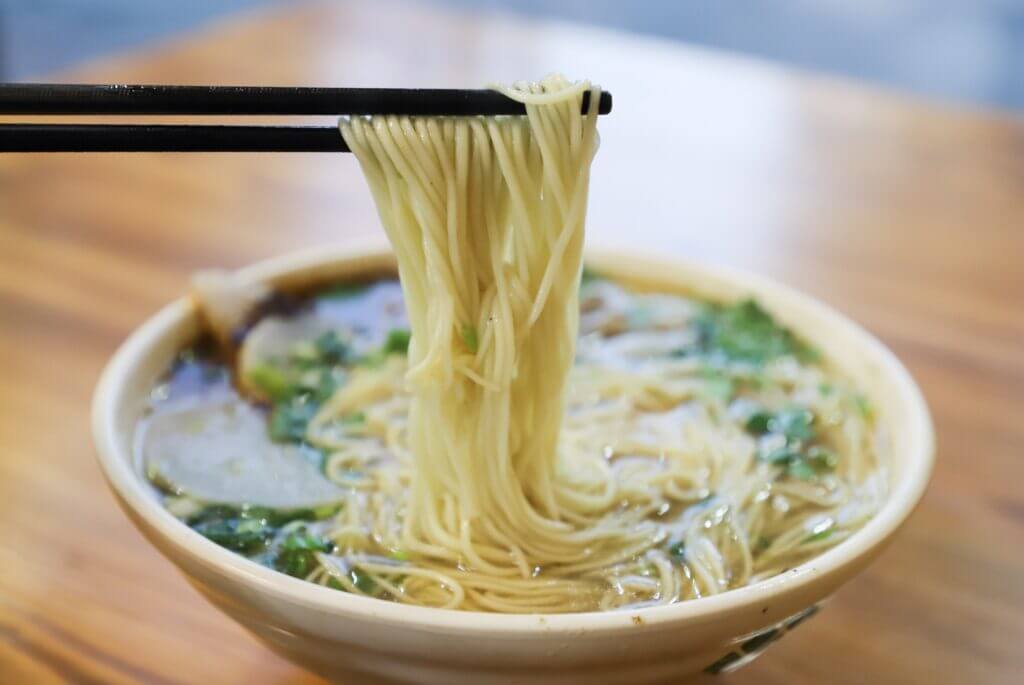
Instant noodles and ramen often contain high levels of sodium in their seasoning packets[102]. Consuming these regularly can lead to water retention, making the skin appear less youthful and more puffy.
Processed Cheese Products
Processed cheese products like cheese spreads and cheese-flavored snacks[103] can be surprisingly high in sodium. Excessive sodium intake from these products may contribute to skin issues and premature aging.
Portion size, Timings and Healthy Eating for Anti-Aging
Maintaining appropriate portion sizes and meal timings is crucial for supporting healthy eating for anti-aging efforts. Furthermore, these practices help regulate calorie intake, optimize nutrient absorption, and manage factors that contribute to premature aging.
Here’s a breakdown of each:
Recommended Serving Sizes
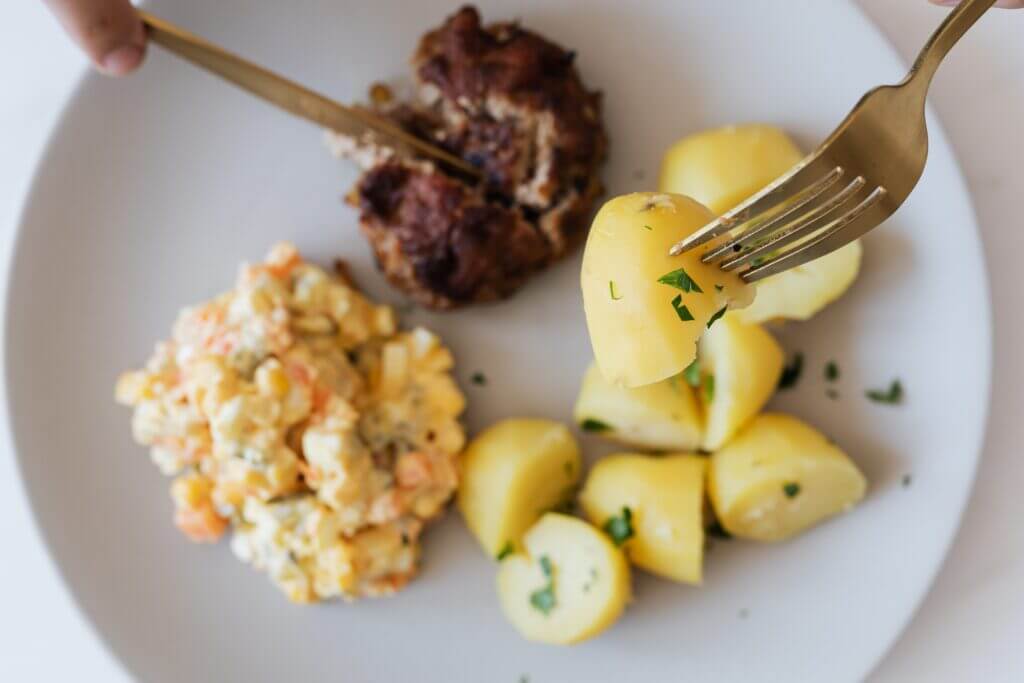
- Balanced Portions: Opt for balanced portions that include a variety of foods, such as lean proteins, whole grains, fruits, and vegetables. This ensures you receive a broad spectrum of nutrients that promote skin health and overall well-being.
- Mindful Eating: Practicing mindful eating helps you pay attention to hunger and fullness cues, preventing overeating. Hence, use smaller plates, chew food slowly, and savor each bite to enhance satisfaction and reduce the risk of excess calorie intake.
- Protein: Include a source of lean protein in each meal to support collagen production and maintain muscle mass, which can help prevent sagging skin.
Optimal Meal Times
- Regular Eating Schedule: Establish a consistent eating schedule to regulate blood sugar levels and prevent energy crashes. Additionally, consuming meals and snacks at regular intervals helps maintain stable energy throughout the day.
- Breakfast: Start your day with a balanced breakfast to jump-start metabolism and provide essential nutrients for skin health.
- Light Dinners: Aim for lighter, well-balanced dinners that are not overly heavy on the stomach, promoting better sleep quality and digestion.
Intermittent Fasting
Intermittent fasting involves cycling between periods of eating and fasting. Moreover, this practice may support anti-aging efforts by improving insulin sensitivity and promoting autophagy, a cellular process that removes damaged components.
- Variations: There are several intermittent fasting approaches, such as the 16/8 method (16 hours of fasting, 8-hour eating window) or the 5:2 method (eating normally for five days and restricting calories for two non-consecutive days).
- Caution: Consult with a healthcare professional before starting intermittent fasting, especially if you have underlying health conditions or specific dietary needs.
Diet Plan for Anti-Aging

Creating a healthy eating for anti-aging diet plan involves incorporating foods rich in antioxidants, healthy fats, and essential nutrients while minimizing or avoiding processed and sugary foods.
Anti-Aging Diet Plan for Women
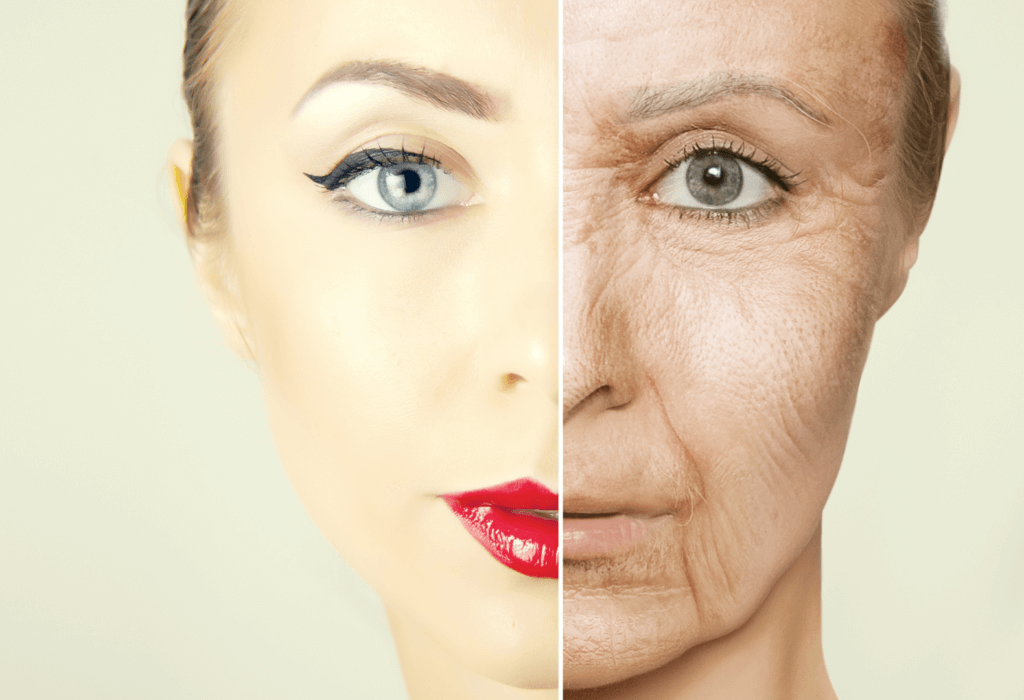
An anti-aging diet plan for women focuses on nourishing the body with the right nutrients to support skin health[104], maintain a youthful appearance, and promote overall well-being. It’s important to tailor the diet to individual preferences, dietary restrictions, and age-related needs.
Here’s an overview of an anti-aging diet plan for women, which includes options for both vegetarians and non-vegetarians, as well as specific considerations for women in their 30s and 50s.
Vegetarian Diet Plan
- Breakfast: Greek yogurt with mixed berries and chia seeds.
- Mid-Morning Snack: Almonds and a piece of fruit.
- Lunch: Chickpea salad with spinach, tomatoes, cucumbers, and a tahini dressing.
- Afternoon Snack: Carrot and bell pepper sticks with hummus.
- Dinner: Grilled portobello mushrooms with quinoa and steamed asparagus.
- Evening Snack (if needed): A small bowl of mixed berries or a piece of dark chocolate (70% cocoa or higher).
Non-Veg Diet Plan
- Breakfast: Scrambled eggs with sautéed spinach and whole-grain toast.
- Mid-Morning Snack: A small handful of mixed nuts.
- Lunch: Grilled chicken breast salad with mixed greens, cherry tomatoes, and balsamic vinaigrette.
- Afternoon Snack: Sliced cucumber and carrot sticks with hummus.
- Dinner: Baked salmon with quinoa and steamed broccoli.
- Evening Snack (if needed): A piece of fruit or a small bowl of yogurt.
Anti-Aging Diet for Women in their 30s
- Focus on a balanced diet with plenty of antioxidants from fruits and vegetables.
- Incorporate lean proteins and healthy fats for skin health.
- Pay attention to hydration and practice sun protection to prevent premature aging.
Anti-Aging Diet for Women in their 50s
- Prioritize foods rich in calcium and vitamin D for bone health.
- Maintain a well-rounded diet with a focus on collagen-supporting nutrients like vitamin C.
- Consider calcium and vitamin D supplements if needed.
Both age groups should adhere to portion control, regular meal times, and a balanced intake of nutrients. Consult with a healthcare professional or dietitian for personalized adjustments based on individual health and nutritional needs.
Anti-Aging Diet Plan for Men
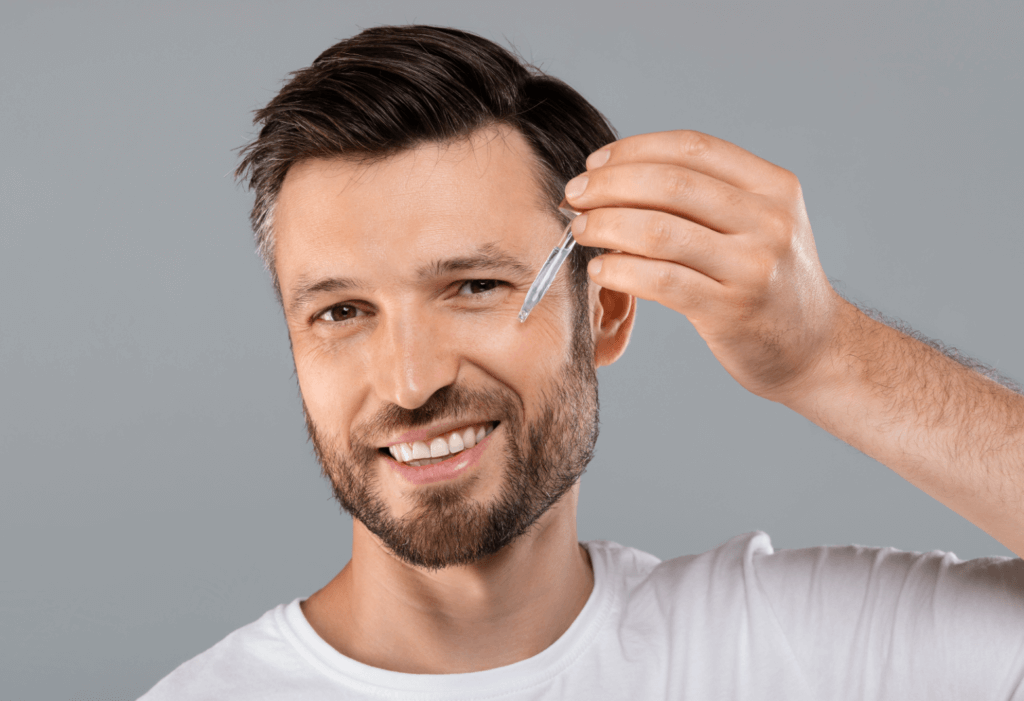
Men, like women, can benefit from a healthy eating for anti-aging diet plan that supports skin health, vitality, and overall well-being as they age. The key is to choose foods rich in essential nutrients and antioxidants[105] while avoiding processed and unhealthy options.
Here’s an overview of an anti-aging diet plan for men, with options for both vegetarians and non-vegetarians, as well as specific considerations for men in their 30s and 50s.
Vegetarian Diet Plan for Men
- Breakfast: Greek yogurt with mixed berries and a sprinkle of chia seeds.
- Mid-Morning Snack: A small handful of mixed nuts.
- Lunch: Chickpea salad with spinach, tomatoes, cucumbers, and a tahini dressing.
- Afternoon Snack: Sliced cucumber and carrot sticks with hummus.
- Dinner: Grilled portobello mushrooms with quinoa and steamed asparagus.
- Evening Snack (if needed): A small bowl of mixed berries or a piece of dark chocolate (70% cocoa or higher).
Non-Veg Diet Plan for Men
- Breakfast: Scrambled eggs with sautéed spinach and whole-grain toast.
- Mid-Morning Snack: A small handful of mixed nuts.
- Lunch: Grilled chicken breast salad with mixed greens, cherry tomatoes, and balsamic vinaigrette.
- Afternoon Snack: Sliced cucumber and carrot sticks with hummus.
- Dinner: Baked salmon with quinoa and steamed broccoli.
- Evening Snack (if needed): A piece of fruit or a small bowl of yogurt.
Anti-Aging Diet for Men in Their 30s
- Prioritize a balanced diet rich in antioxidants and nutrients to support collagen production and skin health.
- Maintain a regular exercise routine to promote muscle tone and overall vitality.
- Get enough sleep and manage stress to reduce the risk of premature aging.
Anti-Aging Diet for Men in Their 50s
- Focus on foods that support bone health, including dairy products and calcium-rich foods.
- Ensure adequate protein intake to prevent muscle loss associated with aging.
- Consider supplements like vitamin D if needed for bone health.
- Additionally, continue exercising to maintain strength and flexibility as you age.
Foods for Anti-Aging Myths Vs. Facts
When it comes to healthy eating for anti-aging, there is a wealth of information, but not all of it is accurate. It’s important to separate fact from fiction to make informed dietary choices for promoting longevity and skin health.
Here are some common myths regarding anti-aging foods and the truth behind them:
| Myth | Fact |
|---|---|
| Superfoods Reverse Aging | No single superfood can reverse aging; a balanced diet with fruits, vegetables, lean proteins, and healthy fats is essential. |
| Supplements Replace a Healthy Diet | Supplements complement, not replace, a well-rounded diet with broader nutrients. |
| Collagen Supplements Improve Skin | A diet rich in vitamin C, amino acids, and antioxidants is vital for skin health. |
| Unlimited Healthy Fats Are Fine | Healthy fats are beneficial but calorie-dense, portion control is crucial for skin and weight |
| Sugar-Free Sweeteners Are Skin-friendly | Artificial sweeteners may disrupt gut health, potentially affecting the skin. Moderation is key. |
Dietary Restrictions and Allergies

Maintaining a healthy eating for anti-aging is essential, but it can be challenging for individuals with dietary restrictions or food allergies. However, it’s entirely possible to adapt an anti-aging diet to accommodate various dietary needs while still reaping the benefits of longevity and skin health.
Catering to Dietary Restrictions
- Vegetarian and Vegan Diets: Vegetarian and vegan diets can be rich in antioxidants, fiber, and healthy fats, promoting skin health. Include a variety of plant-based proteins like beans, lentils, tofu, and nuts to meet protein needs.
- Gluten-Free Diet: For those with gluten sensitivity or celiac disease, opt for naturally gluten-free whole grains like rice, quinoa, and oats. Ensure skincare products are also gluten-free to prevent skin reactions.
- Dairy-Free Diet: Replace dairy with fortified plant-based alternatives like almond, soy, or oat milk. So that these options can provide essential nutrients without the need for dairy.
Food Allergies and Sensitivities
- Nut Allergies: If allergic to nuts, explore seeds like chia, flax, and sunflower seeds, which are rich in healthy fats and nutrients. Additionally, read food labels carefully and avoid products with “may contain nuts” warnings.
- Shellfish Allergies: Replace shellfish with other protein sources like fish, poultry, or plant-based options. Moreover, check ingredient lists on sauces and seasonings to avoid hidden shellfish components.
Diabetes-Friendly Diet
- Carbohydrate Control: For individuals with diabetes, managing carbohydrate intake is crucial. Choose whole grains, legumes, and non-starchy vegetables to maintain stable blood sugar levels.
- Portion Control: Be mindful of portion sizes to avoid blood sugar spikes. Balanced meals and snacks can help prevent energy crashes and support skin health.
Anti-Inflammatory Diet
- Omega-3 Fatty Acids: Incorporate omega-3-rich foods like fatty fish (salmon, mackerel), flaxseeds, and walnuts to combat inflammation, which can accelerate aging.
- Colorful Fruits and Vegetables: Consume a variety of colorful fruits and vegetables, such as berries, leafy greens, and tomatoes, as they contain antioxidants that help reduce inflammation.
Conclusion
As we wrap up our journey into healthy eating for anti-aging, here’s the scoop: Your diet can be your best pal on the road to looking and feeling younger. Fill your plate with colorful fruits and veggies, toss in some good fats from avocados and nuts, and don’t forget the lean proteins. These choices can help your skin stay fresh and your body in tip-top shape.
But remember, it’s not just about food. Getting enough sleep, managing stress, protecting your skin from the sun, and sticking to a skincare routine all matter too. And when it comes to food, keep it personalized to suit your tastes and needs. Talk to a healthcare expert or dietitian to create a personalized anti-aging plan that suits your lifestyle.
So, here’s to aging gracefully and healthily—inside and out!
Frequently Asked Questions
1. What is an anti-aging diet?
An anti-aging diet is a nutritional approach focused on consuming foods that promote overall well-being, skin health, and vitality as you age.
2. Which foods are good for healthy aging?
Good foods for healthy aging include colorful fruits and vegetables, healthy fats like avocados and nuts, lean proteins, and whole grains.
3. Can diet help with wrinkles and fine lines?
A balanced diet can help reduce the appearance of wrinkles and fine lines over time by providing essential nutrients that support skin elasticity and collagen production.
4. Can I still enjoy treats while following an anti-aging diet?
Yes, occasional treats are okay. The key is moderation. Enjoying indulgent treats in moderation can be a part of a healthy anti-aging diet.
5. What else besides diet can help with healthy aging?
Besides diet, factors like quality sleep, stress management, sun protection, and a consistent skincare routine also play vital roles in healthy aging.
6. Can a single superfood reverse aging?
No, a variety of nutrient-dense foods is needed for long-term well-being; there’s no single magic superfood.
7. Are sugar-free sweeteners better for the skin?
Some studies suggest artificial sweeteners may disrupt gut health, potentially affecting skin health.
8. What role do antioxidants play in anti-aging diets?
Antioxidants combat free radicals, reducing oxidative stress and supporting overall health.
9. Can dietary restrictions and allergies be accommodated in an anti-aging diet?
Yes, anti-aging diets can be customized to accommodate dietary restrictions and food allergies.
10. How can hydration contribute to anti-aging?
Staying well-hydrated supports skin health, digestion, and overall well-being.
11. Can you recommend specific foods that help maintain youthful skin?
Foods like berries, leafy greens, and fatty fish are known for their skin-boosting properties.
12. What are the potential benefits of anti-aging drinks like teas and smoothies?
These drinks often contain antioxidants and nutrients that can support overall health and skin vitality.
13. How can one maintain a healthy weight as part of an anti-aging strategy?
A combination of diet and regular physical activity is key to weight management and healthy aging.
14. Can a vegetarian or vegan diet provide the necessary nutrients for healthy aging?
Yes, with proper planning, plant-based diets can be rich in antioxidants, fiber, and essential nutrients.
Foods high in calcium and vitamin D, such as dairy products and leafy greens, support bone health.







